Impact of Governmental Policy and Police Response to Terrorism
VerifiedAdded on 2023/01/11
|22
|7180
|84
AI Summary
This essay analyzes the impact of governmental policies and police response to terrorism in the context of societal trends. It discusses the root causes of terrorism and recent trends, as well as the role of police forces in addressing the problem.
Contribute Materials
Your contribution can guide someone’s learning journey. Share your
documents today.
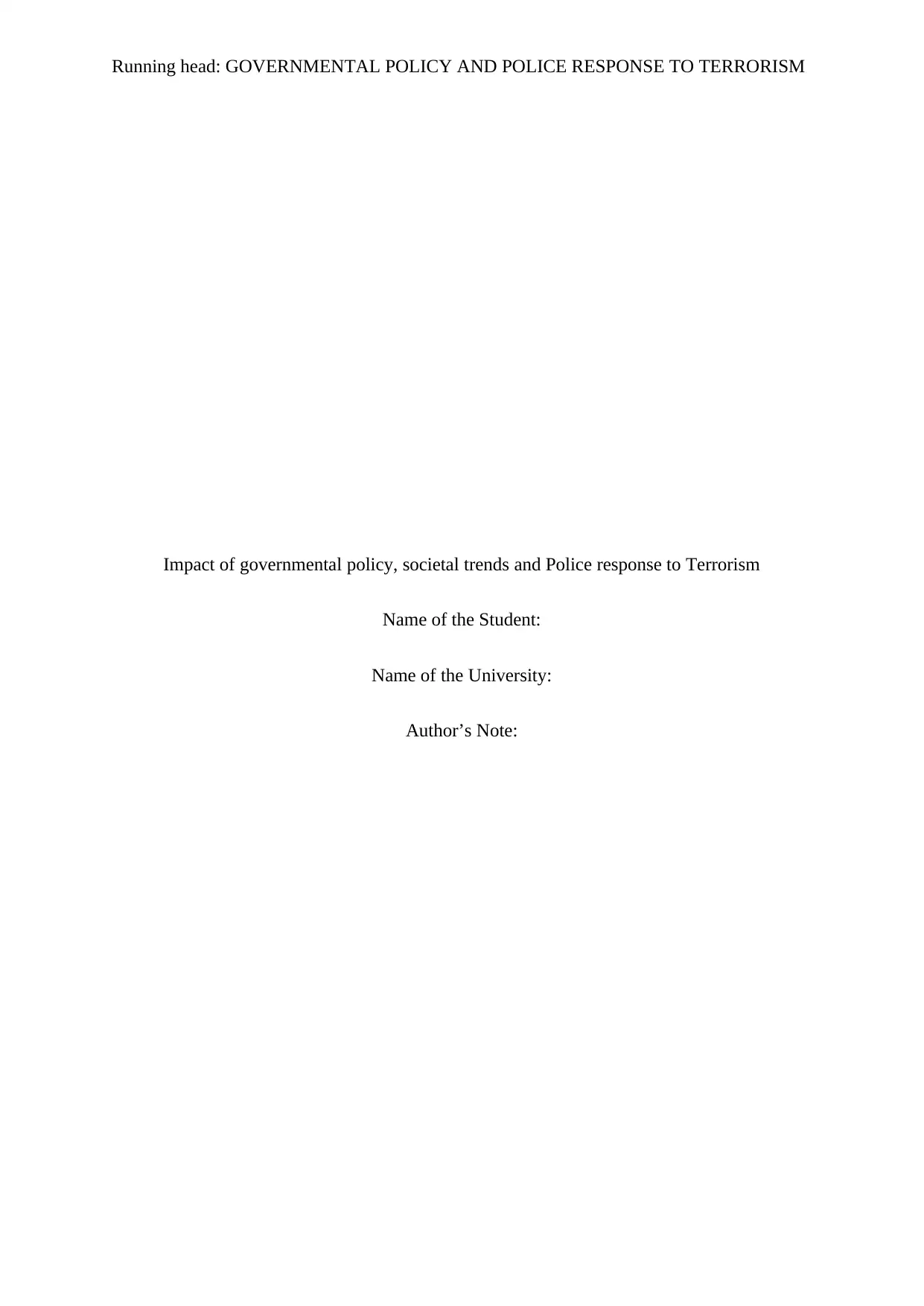
Running head: GOVERNMENTAL POLICY AND POLICE RESPONSE TO TERRORISM
Impact of governmental policy, societal trends and Police response to Terrorism
Name of the Student:
Name of the University:
Author’s Note:
Impact of governmental policy, societal trends and Police response to Terrorism
Name of the Student:
Name of the University:
Author’s Note:
Secure Best Marks with AI Grader
Need help grading? Try our AI Grader for instant feedback on your assignments.
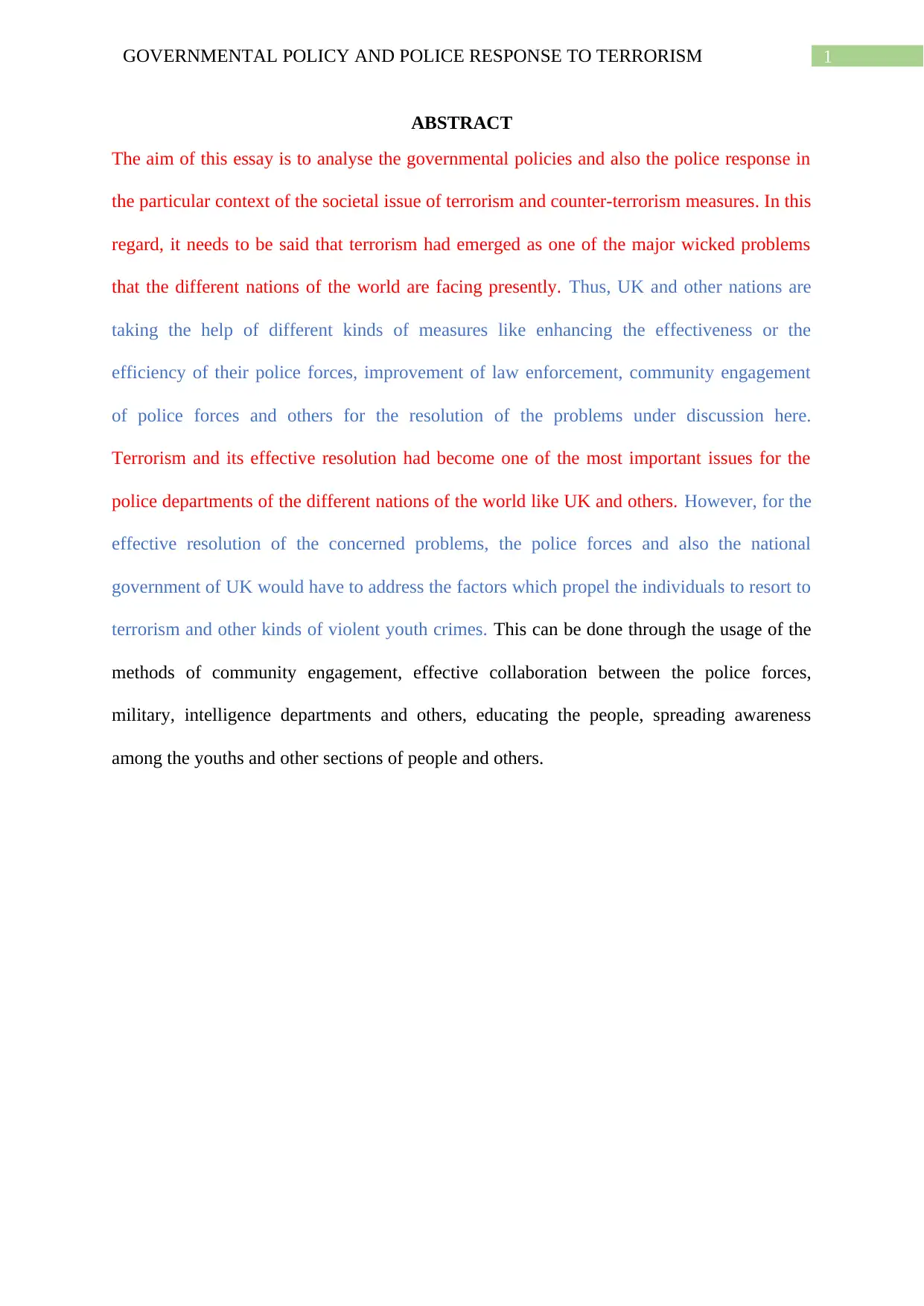
1GOVERNMENTAL POLICY AND POLICE RESPONSE TO TERRORISM
ABSTRACT
The aim of this essay is to analyse the governmental policies and also the police response in
the particular context of the societal issue of terrorism and counter-terrorism measures. In this
regard, it needs to be said that terrorism had emerged as one of the major wicked problems
that the different nations of the world are facing presently. Thus, UK and other nations are
taking the help of different kinds of measures like enhancing the effectiveness or the
efficiency of their police forces, improvement of law enforcement, community engagement
of police forces and others for the resolution of the problems under discussion here.
Terrorism and its effective resolution had become one of the most important issues for the
police departments of the different nations of the world like UK and others. However, for the
effective resolution of the concerned problems, the police forces and also the national
government of UK would have to address the factors which propel the individuals to resort to
terrorism and other kinds of violent youth crimes. This can be done through the usage of the
methods of community engagement, effective collaboration between the police forces,
military, intelligence departments and others, educating the people, spreading awareness
among the youths and other sections of people and others.
ABSTRACT
The aim of this essay is to analyse the governmental policies and also the police response in
the particular context of the societal issue of terrorism and counter-terrorism measures. In this
regard, it needs to be said that terrorism had emerged as one of the major wicked problems
that the different nations of the world are facing presently. Thus, UK and other nations are
taking the help of different kinds of measures like enhancing the effectiveness or the
efficiency of their police forces, improvement of law enforcement, community engagement
of police forces and others for the resolution of the problems under discussion here.
Terrorism and its effective resolution had become one of the most important issues for the
police departments of the different nations of the world like UK and others. However, for the
effective resolution of the concerned problems, the police forces and also the national
government of UK would have to address the factors which propel the individuals to resort to
terrorism and other kinds of violent youth crimes. This can be done through the usage of the
methods of community engagement, effective collaboration between the police forces,
military, intelligence departments and others, educating the people, spreading awareness
among the youths and other sections of people and others.
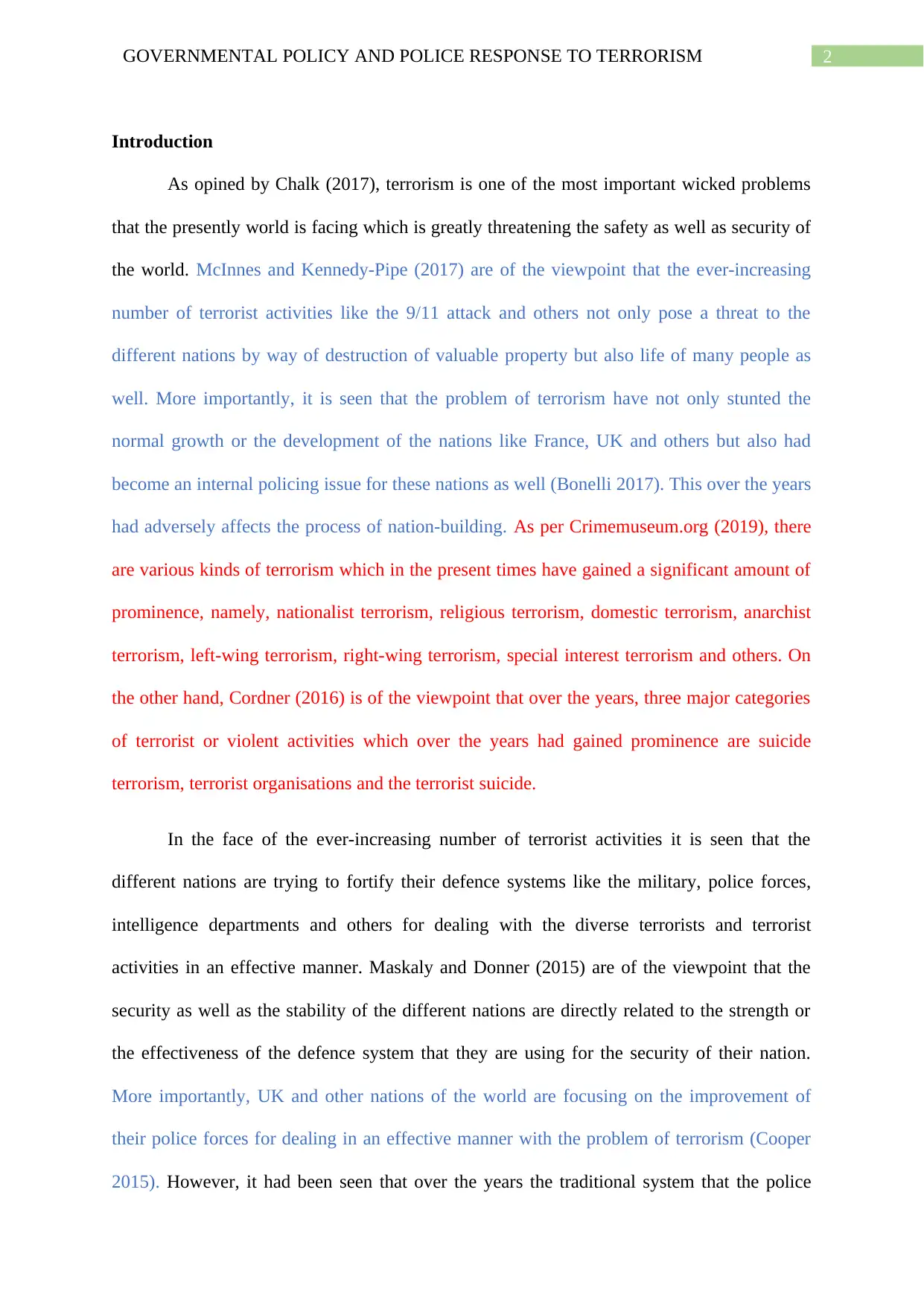
2GOVERNMENTAL POLICY AND POLICE RESPONSE TO TERRORISM
Introduction
As opined by Chalk (2017), terrorism is one of the most important wicked problems
that the presently world is facing which is greatly threatening the safety as well as security of
the world. McInnes and Kennedy-Pipe (2017) are of the viewpoint that the ever-increasing
number of terrorist activities like the 9/11 attack and others not only pose a threat to the
different nations by way of destruction of valuable property but also life of many people as
well. More importantly, it is seen that the problem of terrorism have not only stunted the
normal growth or the development of the nations like France, UK and others but also had
become an internal policing issue for these nations as well (Bonelli 2017). This over the years
had adversely affects the process of nation-building. As per Crimemuseum.org (2019), there
are various kinds of terrorism which in the present times have gained a significant amount of
prominence, namely, nationalist terrorism, religious terrorism, domestic terrorism, anarchist
terrorism, left-wing terrorism, right-wing terrorism, special interest terrorism and others. On
the other hand, Cordner (2016) is of the viewpoint that over the years, three major categories
of terrorist or violent activities which over the years had gained prominence are suicide
terrorism, terrorist organisations and the terrorist suicide.
In the face of the ever-increasing number of terrorist activities it is seen that the
different nations are trying to fortify their defence systems like the military, police forces,
intelligence departments and others for dealing with the diverse terrorists and terrorist
activities in an effective manner. Maskaly and Donner (2015) are of the viewpoint that the
security as well as the stability of the different nations are directly related to the strength or
the effectiveness of the defence system that they are using for the security of their nation.
More importantly, UK and other nations of the world are focusing on the improvement of
their police forces for dealing in an effective manner with the problem of terrorism (Cooper
2015). However, it had been seen that over the years the traditional system that the police
Introduction
As opined by Chalk (2017), terrorism is one of the most important wicked problems
that the presently world is facing which is greatly threatening the safety as well as security of
the world. McInnes and Kennedy-Pipe (2017) are of the viewpoint that the ever-increasing
number of terrorist activities like the 9/11 attack and others not only pose a threat to the
different nations by way of destruction of valuable property but also life of many people as
well. More importantly, it is seen that the problem of terrorism have not only stunted the
normal growth or the development of the nations like France, UK and others but also had
become an internal policing issue for these nations as well (Bonelli 2017). This over the years
had adversely affects the process of nation-building. As per Crimemuseum.org (2019), there
are various kinds of terrorism which in the present times have gained a significant amount of
prominence, namely, nationalist terrorism, religious terrorism, domestic terrorism, anarchist
terrorism, left-wing terrorism, right-wing terrorism, special interest terrorism and others. On
the other hand, Cordner (2016) is of the viewpoint that over the years, three major categories
of terrorist or violent activities which over the years had gained prominence are suicide
terrorism, terrorist organisations and the terrorist suicide.
In the face of the ever-increasing number of terrorist activities it is seen that the
different nations are trying to fortify their defence systems like the military, police forces,
intelligence departments and others for dealing with the diverse terrorists and terrorist
activities in an effective manner. Maskaly and Donner (2015) are of the viewpoint that the
security as well as the stability of the different nations are directly related to the strength or
the effectiveness of the defence system that they are using for the security of their nation.
More importantly, UK and other nations of the world are focusing on the improvement of
their police forces for dealing in an effective manner with the problem of terrorism (Cooper
2015). However, it had been seen that over the years the traditional system that the police
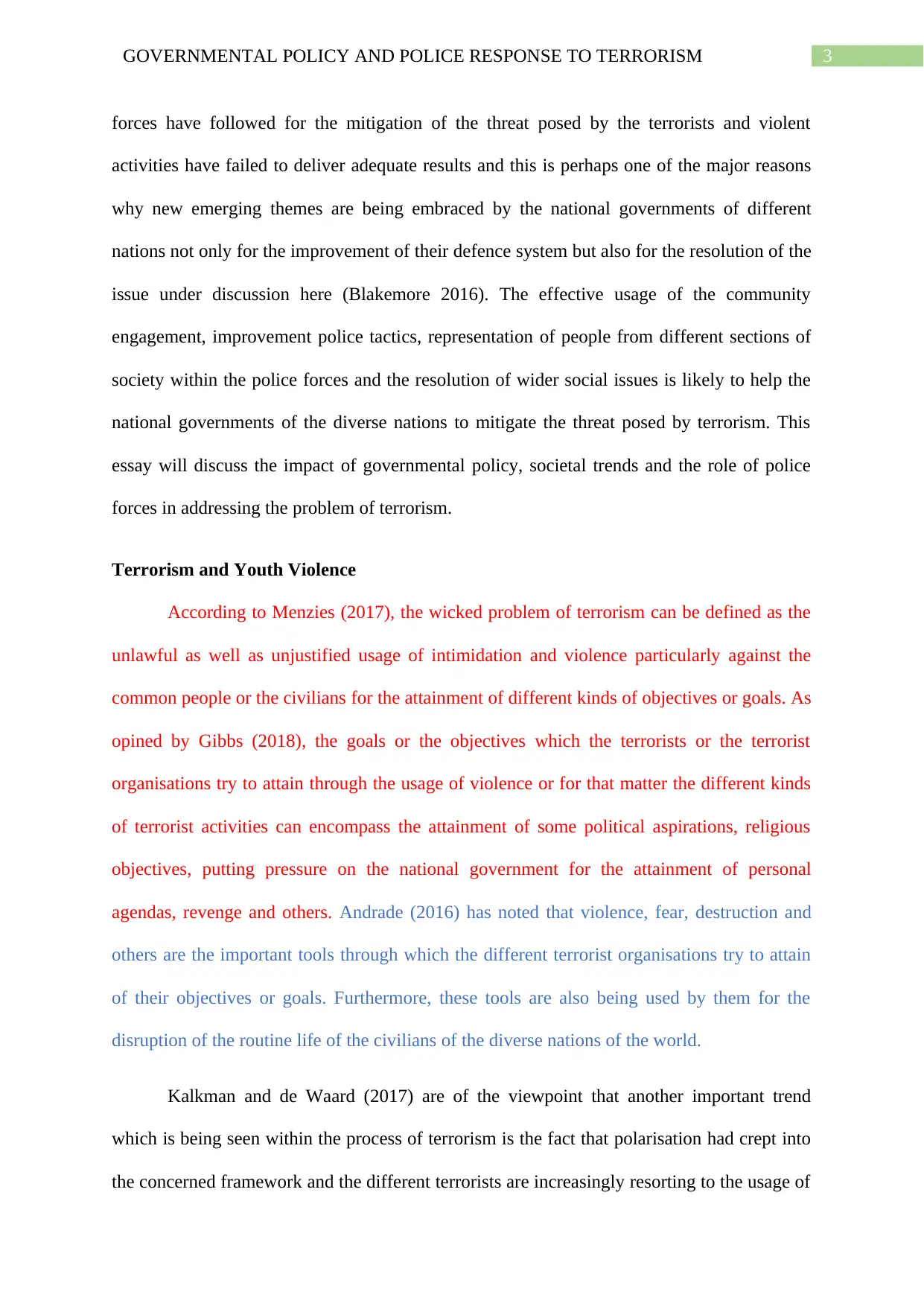
3GOVERNMENTAL POLICY AND POLICE RESPONSE TO TERRORISM
forces have followed for the mitigation of the threat posed by the terrorists and violent
activities have failed to deliver adequate results and this is perhaps one of the major reasons
why new emerging themes are being embraced by the national governments of different
nations not only for the improvement of their defence system but also for the resolution of the
issue under discussion here (Blakemore 2016). The effective usage of the community
engagement, improvement police tactics, representation of people from different sections of
society within the police forces and the resolution of wider social issues is likely to help the
national governments of the diverse nations to mitigate the threat posed by terrorism. This
essay will discuss the impact of governmental policy, societal trends and the role of police
forces in addressing the problem of terrorism.
Terrorism and Youth Violence
According to Menzies (2017), the wicked problem of terrorism can be defined as the
unlawful as well as unjustified usage of intimidation and violence particularly against the
common people or the civilians for the attainment of different kinds of objectives or goals. As
opined by Gibbs (2018), the goals or the objectives which the terrorists or the terrorist
organisations try to attain through the usage of violence or for that matter the different kinds
of terrorist activities can encompass the attainment of some political aspirations, religious
objectives, putting pressure on the national government for the attainment of personal
agendas, revenge and others. Andrade (2016) has noted that violence, fear, destruction and
others are the important tools through which the different terrorist organisations try to attain
of their objectives or goals. Furthermore, these tools are also being used by them for the
disruption of the routine life of the civilians of the diverse nations of the world.
Kalkman and de Waard (2017) are of the viewpoint that another important trend
which is being seen within the process of terrorism is the fact that polarisation had crept into
the concerned framework and the different terrorists are increasingly resorting to the usage of
forces have followed for the mitigation of the threat posed by the terrorists and violent
activities have failed to deliver adequate results and this is perhaps one of the major reasons
why new emerging themes are being embraced by the national governments of different
nations not only for the improvement of their defence system but also for the resolution of the
issue under discussion here (Blakemore 2016). The effective usage of the community
engagement, improvement police tactics, representation of people from different sections of
society within the police forces and the resolution of wider social issues is likely to help the
national governments of the diverse nations to mitigate the threat posed by terrorism. This
essay will discuss the impact of governmental policy, societal trends and the role of police
forces in addressing the problem of terrorism.
Terrorism and Youth Violence
According to Menzies (2017), the wicked problem of terrorism can be defined as the
unlawful as well as unjustified usage of intimidation and violence particularly against the
common people or the civilians for the attainment of different kinds of objectives or goals. As
opined by Gibbs (2018), the goals or the objectives which the terrorists or the terrorist
organisations try to attain through the usage of violence or for that matter the different kinds
of terrorist activities can encompass the attainment of some political aspirations, religious
objectives, putting pressure on the national government for the attainment of personal
agendas, revenge and others. Andrade (2016) has noted that violence, fear, destruction and
others are the important tools through which the different terrorist organisations try to attain
of their objectives or goals. Furthermore, these tools are also being used by them for the
disruption of the routine life of the civilians of the diverse nations of the world.
Kalkman and de Waard (2017) are of the viewpoint that another important trend
which is being seen within the process of terrorism is the fact that polarisation had crept into
the concerned framework and the different terrorists are increasingly resorting to the usage of
Secure Best Marks with AI Grader
Need help grading? Try our AI Grader for instant feedback on your assignments.
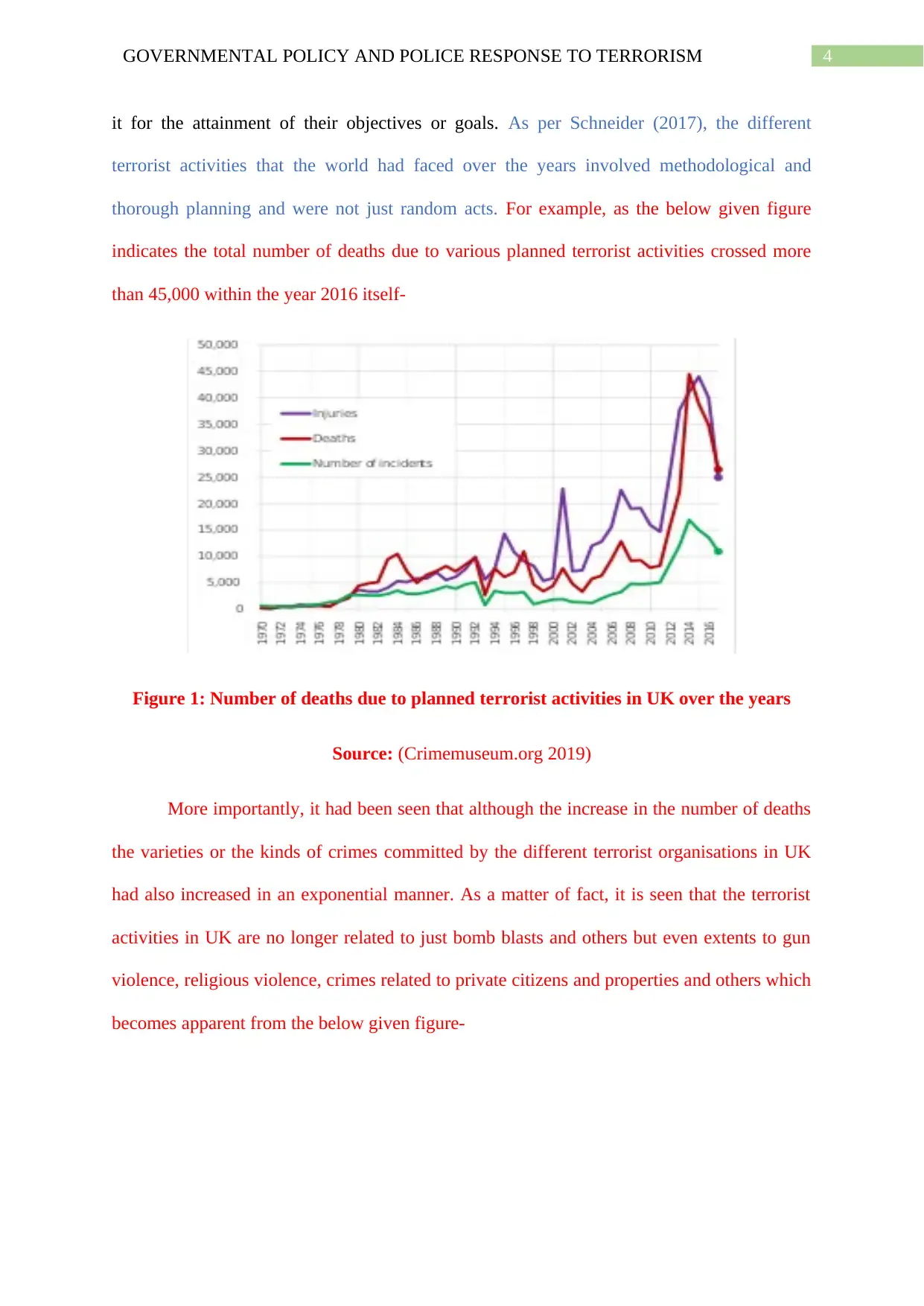
4GOVERNMENTAL POLICY AND POLICE RESPONSE TO TERRORISM
it for the attainment of their objectives or goals. As per Schneider (2017), the different
terrorist activities that the world had faced over the years involved methodological and
thorough planning and were not just random acts. For example, as the below given figure
indicates the total number of deaths due to various planned terrorist activities crossed more
than 45,000 within the year 2016 itself-
Figure 1: Number of deaths due to planned terrorist activities in UK over the years
Source: (Crimemuseum.org 2019)
More importantly, it had been seen that although the increase in the number of deaths
the varieties or the kinds of crimes committed by the different terrorist organisations in UK
had also increased in an exponential manner. As a matter of fact, it is seen that the terrorist
activities in UK are no longer related to just bomb blasts and others but even extents to gun
violence, religious violence, crimes related to private citizens and properties and others which
becomes apparent from the below given figure-
it for the attainment of their objectives or goals. As per Schneider (2017), the different
terrorist activities that the world had faced over the years involved methodological and
thorough planning and were not just random acts. For example, as the below given figure
indicates the total number of deaths due to various planned terrorist activities crossed more
than 45,000 within the year 2016 itself-
Figure 1: Number of deaths due to planned terrorist activities in UK over the years
Source: (Crimemuseum.org 2019)
More importantly, it had been seen that although the increase in the number of deaths
the varieties or the kinds of crimes committed by the different terrorist organisations in UK
had also increased in an exponential manner. As a matter of fact, it is seen that the terrorist
activities in UK are no longer related to just bomb blasts and others but even extents to gun
violence, religious violence, crimes related to private citizens and properties and others which
becomes apparent from the below given figure-
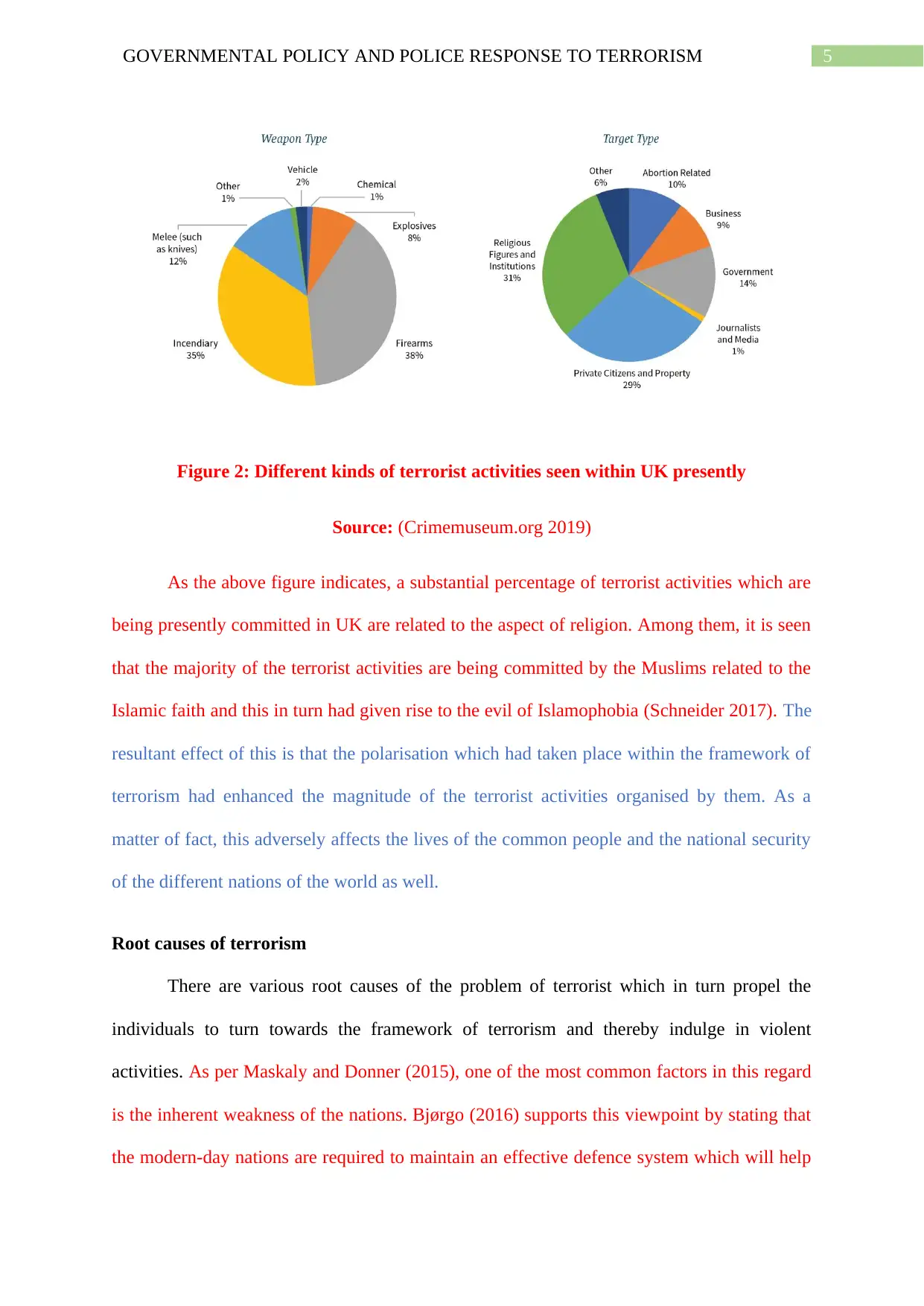
5GOVERNMENTAL POLICY AND POLICE RESPONSE TO TERRORISM
Figure 2: Different kinds of terrorist activities seen within UK presently
Source: (Crimemuseum.org 2019)
As the above figure indicates, a substantial percentage of terrorist activities which are
being presently committed in UK are related to the aspect of religion. Among them, it is seen
that the majority of the terrorist activities are being committed by the Muslims related to the
Islamic faith and this in turn had given rise to the evil of Islamophobia (Schneider 2017). The
resultant effect of this is that the polarisation which had taken place within the framework of
terrorism had enhanced the magnitude of the terrorist activities organised by them. As a
matter of fact, this adversely affects the lives of the common people and the national security
of the different nations of the world as well.
Root causes of terrorism
There are various root causes of the problem of terrorist which in turn propel the
individuals to turn towards the framework of terrorism and thereby indulge in violent
activities. As per Maskaly and Donner (2015), one of the most common factors in this regard
is the inherent weakness of the nations. Bjørgo (2016) supports this viewpoint by stating that
the modern-day nations are required to maintain an effective defence system which will help
Figure 2: Different kinds of terrorist activities seen within UK presently
Source: (Crimemuseum.org 2019)
As the above figure indicates, a substantial percentage of terrorist activities which are
being presently committed in UK are related to the aspect of religion. Among them, it is seen
that the majority of the terrorist activities are being committed by the Muslims related to the
Islamic faith and this in turn had given rise to the evil of Islamophobia (Schneider 2017). The
resultant effect of this is that the polarisation which had taken place within the framework of
terrorism had enhanced the magnitude of the terrorist activities organised by them. As a
matter of fact, this adversely affects the lives of the common people and the national security
of the different nations of the world as well.
Root causes of terrorism
There are various root causes of the problem of terrorist which in turn propel the
individuals to turn towards the framework of terrorism and thereby indulge in violent
activities. As per Maskaly and Donner (2015), one of the most common factors in this regard
is the inherent weakness of the nations. Bjørgo (2016) supports this viewpoint by stating that
the modern-day nations are required to maintain an effective defence system which will help
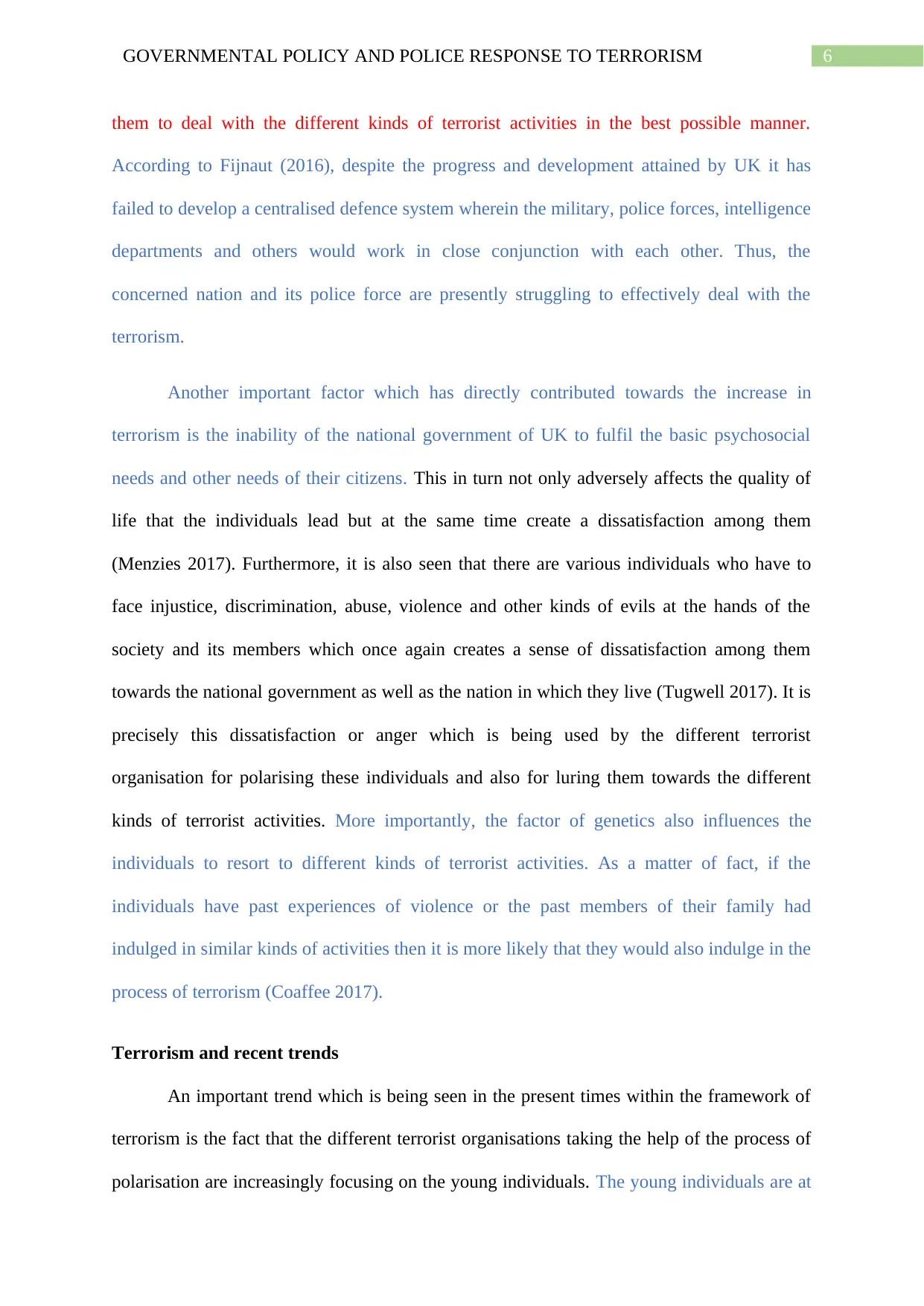
6GOVERNMENTAL POLICY AND POLICE RESPONSE TO TERRORISM
them to deal with the different kinds of terrorist activities in the best possible manner.
According to Fijnaut (2016), despite the progress and development attained by UK it has
failed to develop a centralised defence system wherein the military, police forces, intelligence
departments and others would work in close conjunction with each other. Thus, the
concerned nation and its police force are presently struggling to effectively deal with the
terrorism.
Another important factor which has directly contributed towards the increase in
terrorism is the inability of the national government of UK to fulfil the basic psychosocial
needs and other needs of their citizens. This in turn not only adversely affects the quality of
life that the individuals lead but at the same time create a dissatisfaction among them
(Menzies 2017). Furthermore, it is also seen that there are various individuals who have to
face injustice, discrimination, abuse, violence and other kinds of evils at the hands of the
society and its members which once again creates a sense of dissatisfaction among them
towards the national government as well as the nation in which they live (Tugwell 2017). It is
precisely this dissatisfaction or anger which is being used by the different terrorist
organisation for polarising these individuals and also for luring them towards the different
kinds of terrorist activities. More importantly, the factor of genetics also influences the
individuals to resort to different kinds of terrorist activities. As a matter of fact, if the
individuals have past experiences of violence or the past members of their family had
indulged in similar kinds of activities then it is more likely that they would also indulge in the
process of terrorism (Coaffee 2017).
Terrorism and recent trends
An important trend which is being seen in the present times within the framework of
terrorism is the fact that the different terrorist organisations taking the help of the process of
polarisation are increasingly focusing on the young individuals. The young individuals are at
them to deal with the different kinds of terrorist activities in the best possible manner.
According to Fijnaut (2016), despite the progress and development attained by UK it has
failed to develop a centralised defence system wherein the military, police forces, intelligence
departments and others would work in close conjunction with each other. Thus, the
concerned nation and its police force are presently struggling to effectively deal with the
terrorism.
Another important factor which has directly contributed towards the increase in
terrorism is the inability of the national government of UK to fulfil the basic psychosocial
needs and other needs of their citizens. This in turn not only adversely affects the quality of
life that the individuals lead but at the same time create a dissatisfaction among them
(Menzies 2017). Furthermore, it is also seen that there are various individuals who have to
face injustice, discrimination, abuse, violence and other kinds of evils at the hands of the
society and its members which once again creates a sense of dissatisfaction among them
towards the national government as well as the nation in which they live (Tugwell 2017). It is
precisely this dissatisfaction or anger which is being used by the different terrorist
organisation for polarising these individuals and also for luring them towards the different
kinds of terrorist activities. More importantly, the factor of genetics also influences the
individuals to resort to different kinds of terrorist activities. As a matter of fact, if the
individuals have past experiences of violence or the past members of their family had
indulged in similar kinds of activities then it is more likely that they would also indulge in the
process of terrorism (Coaffee 2017).
Terrorism and recent trends
An important trend which is being seen in the present times within the framework of
terrorism is the fact that the different terrorist organisations taking the help of the process of
polarisation are increasingly focusing on the young individuals. The young individuals are at
Paraphrase This Document
Need a fresh take? Get an instant paraphrase of this document with our AI Paraphraser
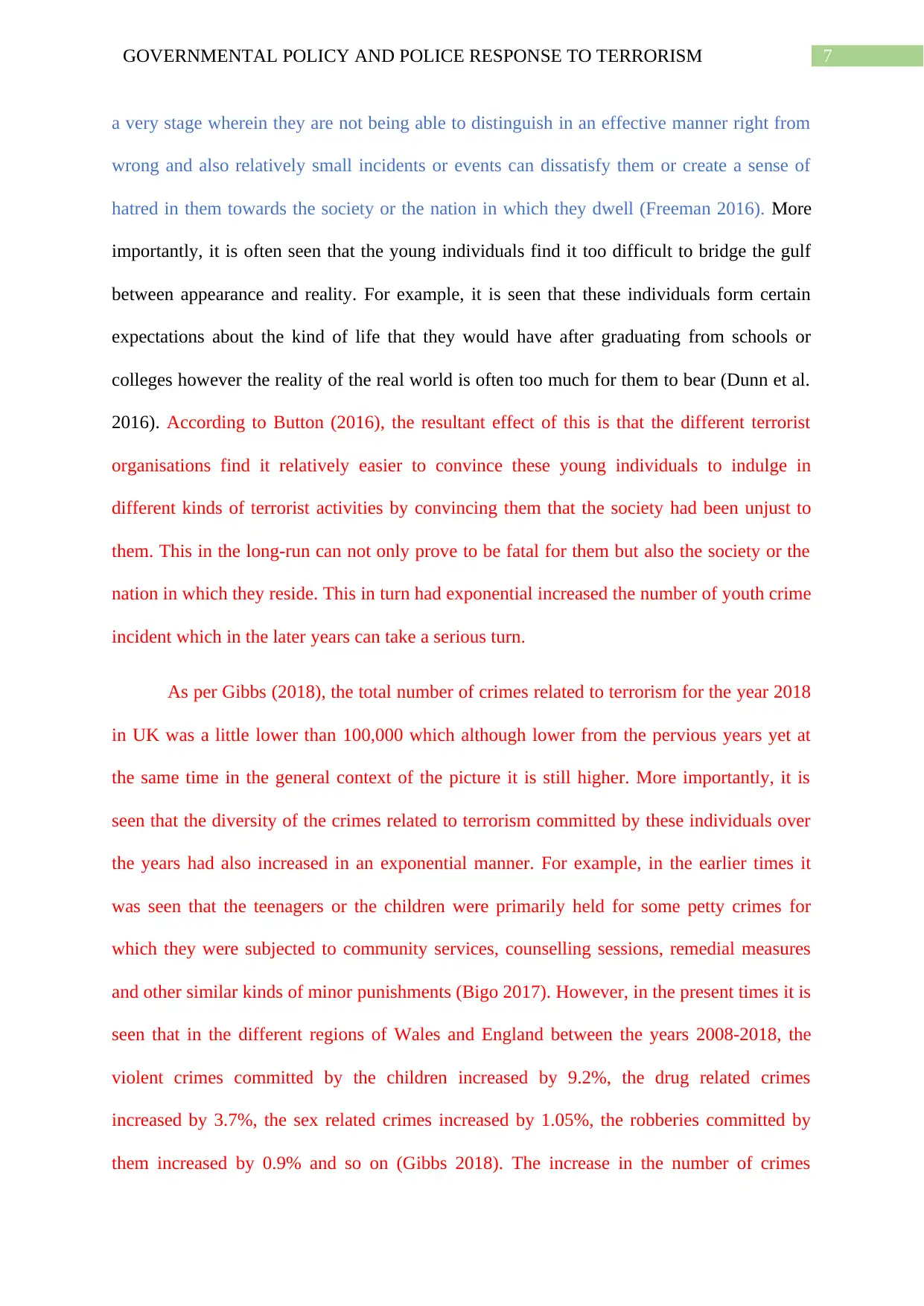
7GOVERNMENTAL POLICY AND POLICE RESPONSE TO TERRORISM
a very stage wherein they are not being able to distinguish in an effective manner right from
wrong and also relatively small incidents or events can dissatisfy them or create a sense of
hatred in them towards the society or the nation in which they dwell (Freeman 2016). More
importantly, it is often seen that the young individuals find it too difficult to bridge the gulf
between appearance and reality. For example, it is seen that these individuals form certain
expectations about the kind of life that they would have after graduating from schools or
colleges however the reality of the real world is often too much for them to bear (Dunn et al.
2016). According to Button (2016), the resultant effect of this is that the different terrorist
organisations find it relatively easier to convince these young individuals to indulge in
different kinds of terrorist activities by convincing them that the society had been unjust to
them. This in the long-run can not only prove to be fatal for them but also the society or the
nation in which they reside. This in turn had exponential increased the number of youth crime
incident which in the later years can take a serious turn.
As per Gibbs (2018), the total number of crimes related to terrorism for the year 2018
in UK was a little lower than 100,000 which although lower from the pervious years yet at
the same time in the general context of the picture it is still higher. More importantly, it is
seen that the diversity of the crimes related to terrorism committed by these individuals over
the years had also increased in an exponential manner. For example, in the earlier times it
was seen that the teenagers or the children were primarily held for some petty crimes for
which they were subjected to community services, counselling sessions, remedial measures
and other similar kinds of minor punishments (Bigo 2017). However, in the present times it is
seen that in the different regions of Wales and England between the years 2008-2018, the
violent crimes committed by the children increased by 9.2%, the drug related crimes
increased by 3.7%, the sex related crimes increased by 1.05%, the robberies committed by
them increased by 0.9% and so on (Gibbs 2018). The increase in the number of crimes
a very stage wherein they are not being able to distinguish in an effective manner right from
wrong and also relatively small incidents or events can dissatisfy them or create a sense of
hatred in them towards the society or the nation in which they dwell (Freeman 2016). More
importantly, it is often seen that the young individuals find it too difficult to bridge the gulf
between appearance and reality. For example, it is seen that these individuals form certain
expectations about the kind of life that they would have after graduating from schools or
colleges however the reality of the real world is often too much for them to bear (Dunn et al.
2016). According to Button (2016), the resultant effect of this is that the different terrorist
organisations find it relatively easier to convince these young individuals to indulge in
different kinds of terrorist activities by convincing them that the society had been unjust to
them. This in the long-run can not only prove to be fatal for them but also the society or the
nation in which they reside. This in turn had exponential increased the number of youth crime
incident which in the later years can take a serious turn.
As per Gibbs (2018), the total number of crimes related to terrorism for the year 2018
in UK was a little lower than 100,000 which although lower from the pervious years yet at
the same time in the general context of the picture it is still higher. More importantly, it is
seen that the diversity of the crimes related to terrorism committed by these individuals over
the years had also increased in an exponential manner. For example, in the earlier times it
was seen that the teenagers or the children were primarily held for some petty crimes for
which they were subjected to community services, counselling sessions, remedial measures
and other similar kinds of minor punishments (Bigo 2017). However, in the present times it is
seen that in the different regions of Wales and England between the years 2008-2018, the
violent crimes committed by the children increased by 9.2%, the drug related crimes
increased by 3.7%, the sex related crimes increased by 1.05%, the robberies committed by
them increased by 0.9% and so on (Gibbs 2018). The increase in the number of crimes
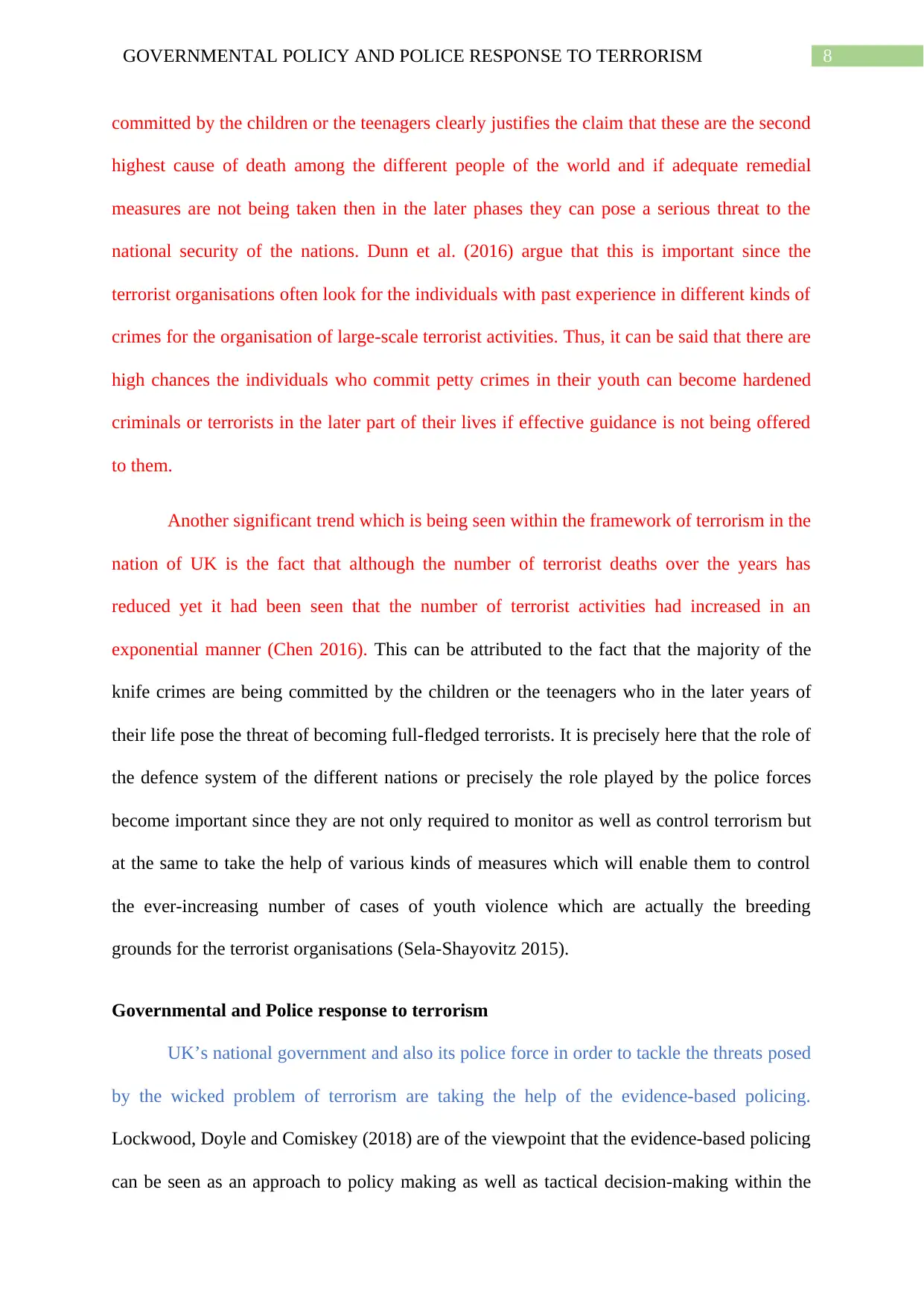
8GOVERNMENTAL POLICY AND POLICE RESPONSE TO TERRORISM
committed by the children or the teenagers clearly justifies the claim that these are the second
highest cause of death among the different people of the world and if adequate remedial
measures are not being taken then in the later phases they can pose a serious threat to the
national security of the nations. Dunn et al. (2016) argue that this is important since the
terrorist organisations often look for the individuals with past experience in different kinds of
crimes for the organisation of large-scale terrorist activities. Thus, it can be said that there are
high chances the individuals who commit petty crimes in their youth can become hardened
criminals or terrorists in the later part of their lives if effective guidance is not being offered
to them.
Another significant trend which is being seen within the framework of terrorism in the
nation of UK is the fact that although the number of terrorist deaths over the years has
reduced yet it had been seen that the number of terrorist activities had increased in an
exponential manner (Chen 2016). This can be attributed to the fact that the majority of the
knife crimes are being committed by the children or the teenagers who in the later years of
their life pose the threat of becoming full-fledged terrorists. It is precisely here that the role of
the defence system of the different nations or precisely the role played by the police forces
become important since they are not only required to monitor as well as control terrorism but
at the same to take the help of various kinds of measures which will enable them to control
the ever-increasing number of cases of youth violence which are actually the breeding
grounds for the terrorist organisations (Sela-Shayovitz 2015).
Governmental and Police response to terrorism
UK’s national government and also its police force in order to tackle the threats posed
by the wicked problem of terrorism are taking the help of the evidence-based policing.
Lockwood, Doyle and Comiskey (2018) are of the viewpoint that the evidence-based policing
can be seen as an approach to policy making as well as tactical decision-making within the
committed by the children or the teenagers clearly justifies the claim that these are the second
highest cause of death among the different people of the world and if adequate remedial
measures are not being taken then in the later phases they can pose a serious threat to the
national security of the nations. Dunn et al. (2016) argue that this is important since the
terrorist organisations often look for the individuals with past experience in different kinds of
crimes for the organisation of large-scale terrorist activities. Thus, it can be said that there are
high chances the individuals who commit petty crimes in their youth can become hardened
criminals or terrorists in the later part of their lives if effective guidance is not being offered
to them.
Another significant trend which is being seen within the framework of terrorism in the
nation of UK is the fact that although the number of terrorist deaths over the years has
reduced yet it had been seen that the number of terrorist activities had increased in an
exponential manner (Chen 2016). This can be attributed to the fact that the majority of the
knife crimes are being committed by the children or the teenagers who in the later years of
their life pose the threat of becoming full-fledged terrorists. It is precisely here that the role of
the defence system of the different nations or precisely the role played by the police forces
become important since they are not only required to monitor as well as control terrorism but
at the same to take the help of various kinds of measures which will enable them to control
the ever-increasing number of cases of youth violence which are actually the breeding
grounds for the terrorist organisations (Sela-Shayovitz 2015).
Governmental and Police response to terrorism
UK’s national government and also its police force in order to tackle the threats posed
by the wicked problem of terrorism are taking the help of the evidence-based policing.
Lockwood, Doyle and Comiskey (2018) are of the viewpoint that the evidence-based policing
can be seen as an approach to policy making as well as tactical decision-making within the
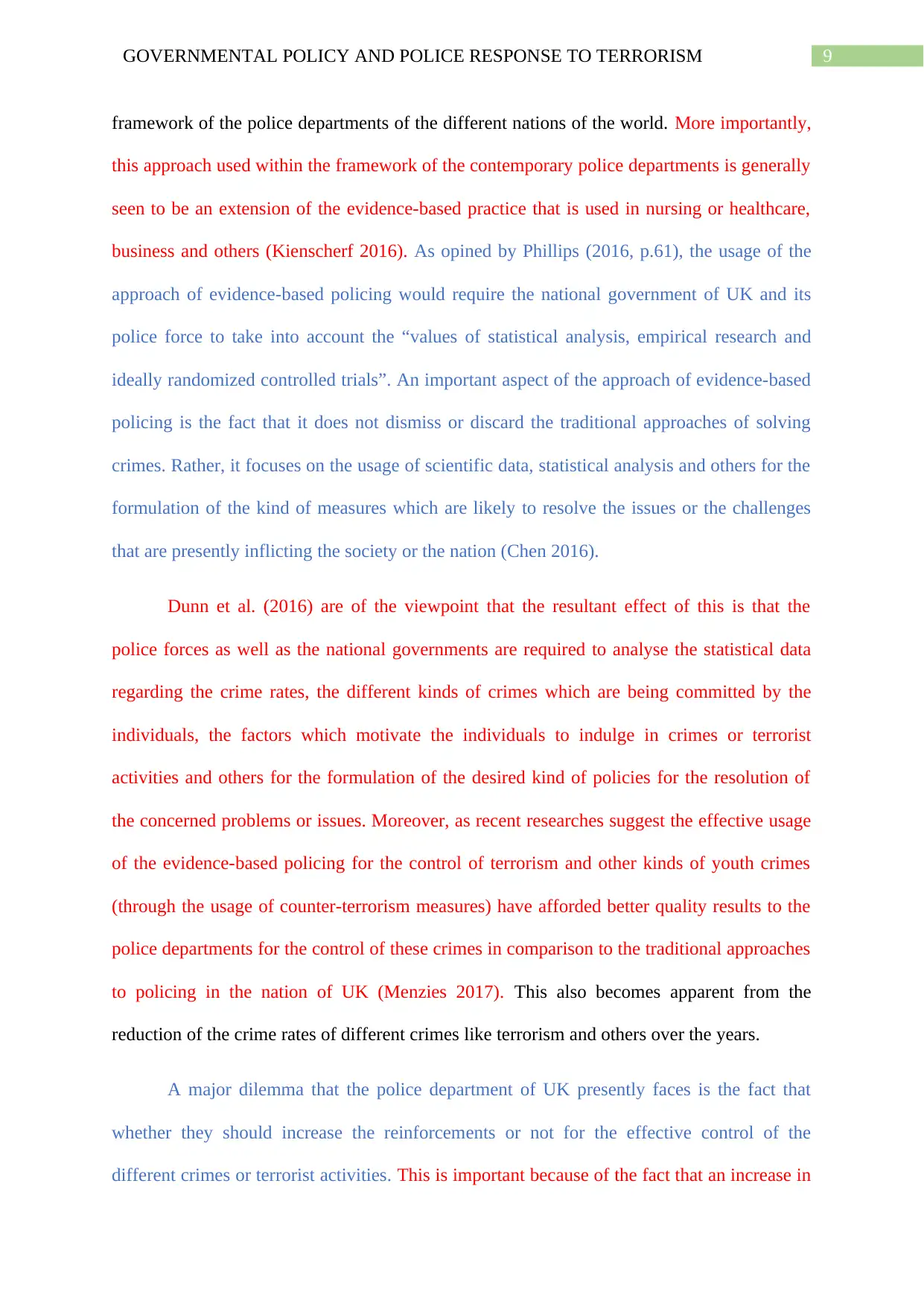
9GOVERNMENTAL POLICY AND POLICE RESPONSE TO TERRORISM
framework of the police departments of the different nations of the world. More importantly,
this approach used within the framework of the contemporary police departments is generally
seen to be an extension of the evidence-based practice that is used in nursing or healthcare,
business and others (Kienscherf 2016). As opined by Phillips (2016, p.61), the usage of the
approach of evidence-based policing would require the national government of UK and its
police force to take into account the “values of statistical analysis, empirical research and
ideally randomized controlled trials”. An important aspect of the approach of evidence-based
policing is the fact that it does not dismiss or discard the traditional approaches of solving
crimes. Rather, it focuses on the usage of scientific data, statistical analysis and others for the
formulation of the kind of measures which are likely to resolve the issues or the challenges
that are presently inflicting the society or the nation (Chen 2016).
Dunn et al. (2016) are of the viewpoint that the resultant effect of this is that the
police forces as well as the national governments are required to analyse the statistical data
regarding the crime rates, the different kinds of crimes which are being committed by the
individuals, the factors which motivate the individuals to indulge in crimes or terrorist
activities and others for the formulation of the desired kind of policies for the resolution of
the concerned problems or issues. Moreover, as recent researches suggest the effective usage
of the evidence-based policing for the control of terrorism and other kinds of youth crimes
(through the usage of counter-terrorism measures) have afforded better quality results to the
police departments for the control of these crimes in comparison to the traditional approaches
to policing in the nation of UK (Menzies 2017). This also becomes apparent from the
reduction of the crime rates of different crimes like terrorism and others over the years.
A major dilemma that the police department of UK presently faces is the fact that
whether they should increase the reinforcements or not for the effective control of the
different crimes or terrorist activities. This is important because of the fact that an increase in
framework of the police departments of the different nations of the world. More importantly,
this approach used within the framework of the contemporary police departments is generally
seen to be an extension of the evidence-based practice that is used in nursing or healthcare,
business and others (Kienscherf 2016). As opined by Phillips (2016, p.61), the usage of the
approach of evidence-based policing would require the national government of UK and its
police force to take into account the “values of statistical analysis, empirical research and
ideally randomized controlled trials”. An important aspect of the approach of evidence-based
policing is the fact that it does not dismiss or discard the traditional approaches of solving
crimes. Rather, it focuses on the usage of scientific data, statistical analysis and others for the
formulation of the kind of measures which are likely to resolve the issues or the challenges
that are presently inflicting the society or the nation (Chen 2016).
Dunn et al. (2016) are of the viewpoint that the resultant effect of this is that the
police forces as well as the national governments are required to analyse the statistical data
regarding the crime rates, the different kinds of crimes which are being committed by the
individuals, the factors which motivate the individuals to indulge in crimes or terrorist
activities and others for the formulation of the desired kind of policies for the resolution of
the concerned problems or issues. Moreover, as recent researches suggest the effective usage
of the evidence-based policing for the control of terrorism and other kinds of youth crimes
(through the usage of counter-terrorism measures) have afforded better quality results to the
police departments for the control of these crimes in comparison to the traditional approaches
to policing in the nation of UK (Menzies 2017). This also becomes apparent from the
reduction of the crime rates of different crimes like terrorism and others over the years.
A major dilemma that the police department of UK presently faces is the fact that
whether they should increase the reinforcements or not for the effective control of the
different crimes or terrorist activities. This is important because of the fact that an increase in
Secure Best Marks with AI Grader
Need help grading? Try our AI Grader for instant feedback on your assignments.
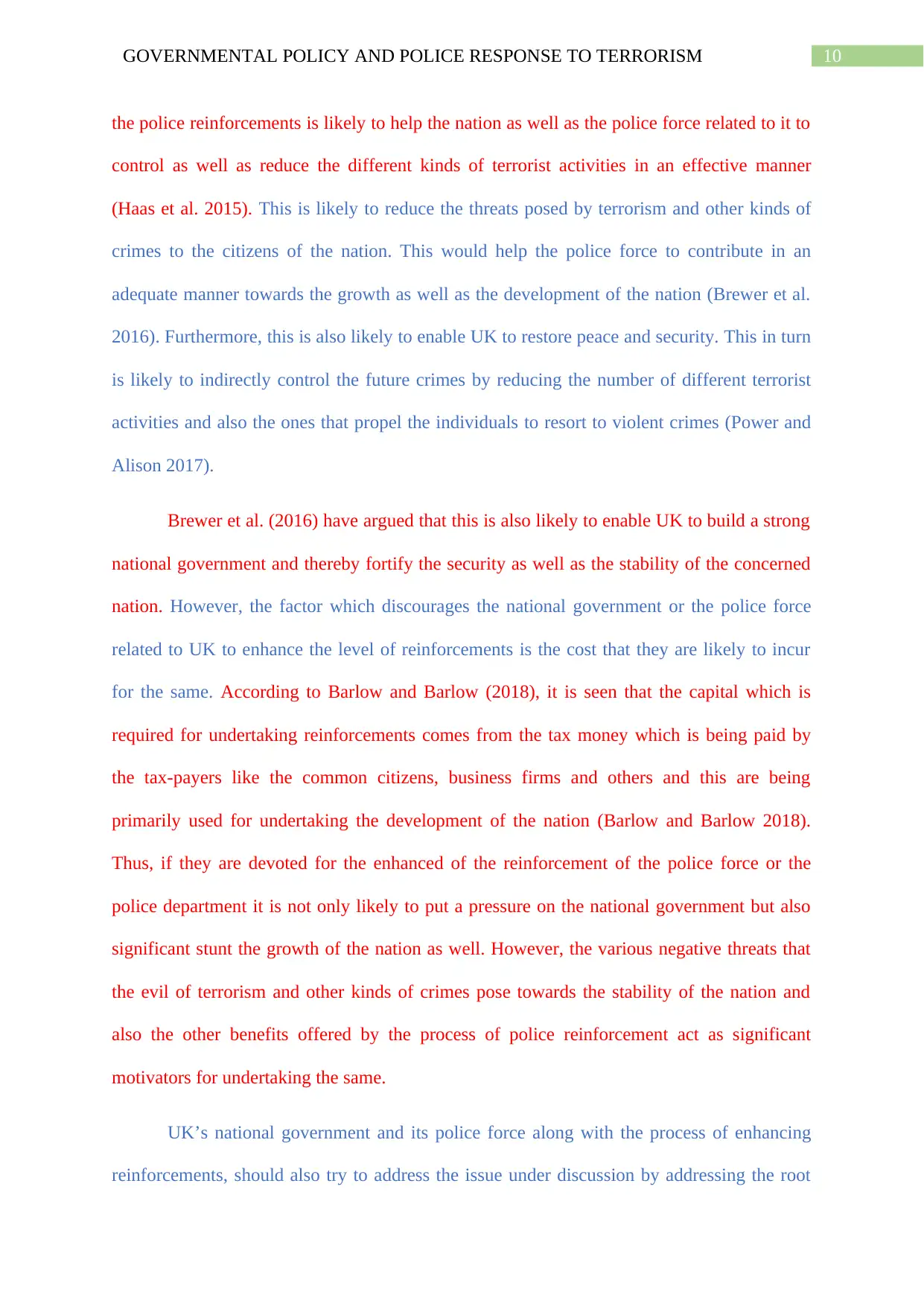
10GOVERNMENTAL POLICY AND POLICE RESPONSE TO TERRORISM
the police reinforcements is likely to help the nation as well as the police force related to it to
control as well as reduce the different kinds of terrorist activities in an effective manner
(Haas et al. 2015). This is likely to reduce the threats posed by terrorism and other kinds of
crimes to the citizens of the nation. This would help the police force to contribute in an
adequate manner towards the growth as well as the development of the nation (Brewer et al.
2016). Furthermore, this is also likely to enable UK to restore peace and security. This in turn
is likely to indirectly control the future crimes by reducing the number of different terrorist
activities and also the ones that propel the individuals to resort to violent crimes (Power and
Alison 2017).
Brewer et al. (2016) have argued that this is also likely to enable UK to build a strong
national government and thereby fortify the security as well as the stability of the concerned
nation. However, the factor which discourages the national government or the police force
related to UK to enhance the level of reinforcements is the cost that they are likely to incur
for the same. According to Barlow and Barlow (2018), it is seen that the capital which is
required for undertaking reinforcements comes from the tax money which is being paid by
the tax-payers like the common citizens, business firms and others and this are being
primarily used for undertaking the development of the nation (Barlow and Barlow 2018).
Thus, if they are devoted for the enhanced of the reinforcement of the police force or the
police department it is not only likely to put a pressure on the national government but also
significant stunt the growth of the nation as well. However, the various negative threats that
the evil of terrorism and other kinds of crimes pose towards the stability of the nation and
also the other benefits offered by the process of police reinforcement act as significant
motivators for undertaking the same.
UK’s national government and its police force along with the process of enhancing
reinforcements, should also try to address the issue under discussion by addressing the root
the police reinforcements is likely to help the nation as well as the police force related to it to
control as well as reduce the different kinds of terrorist activities in an effective manner
(Haas et al. 2015). This is likely to reduce the threats posed by terrorism and other kinds of
crimes to the citizens of the nation. This would help the police force to contribute in an
adequate manner towards the growth as well as the development of the nation (Brewer et al.
2016). Furthermore, this is also likely to enable UK to restore peace and security. This in turn
is likely to indirectly control the future crimes by reducing the number of different terrorist
activities and also the ones that propel the individuals to resort to violent crimes (Power and
Alison 2017).
Brewer et al. (2016) have argued that this is also likely to enable UK to build a strong
national government and thereby fortify the security as well as the stability of the concerned
nation. However, the factor which discourages the national government or the police force
related to UK to enhance the level of reinforcements is the cost that they are likely to incur
for the same. According to Barlow and Barlow (2018), it is seen that the capital which is
required for undertaking reinforcements comes from the tax money which is being paid by
the tax-payers like the common citizens, business firms and others and this are being
primarily used for undertaking the development of the nation (Barlow and Barlow 2018).
Thus, if they are devoted for the enhanced of the reinforcement of the police force or the
police department it is not only likely to put a pressure on the national government but also
significant stunt the growth of the nation as well. However, the various negative threats that
the evil of terrorism and other kinds of crimes pose towards the stability of the nation and
also the other benefits offered by the process of police reinforcement act as significant
motivators for undertaking the same.
UK’s national government and its police force along with the process of enhancing
reinforcements, should also try to address the issue under discussion by addressing the root
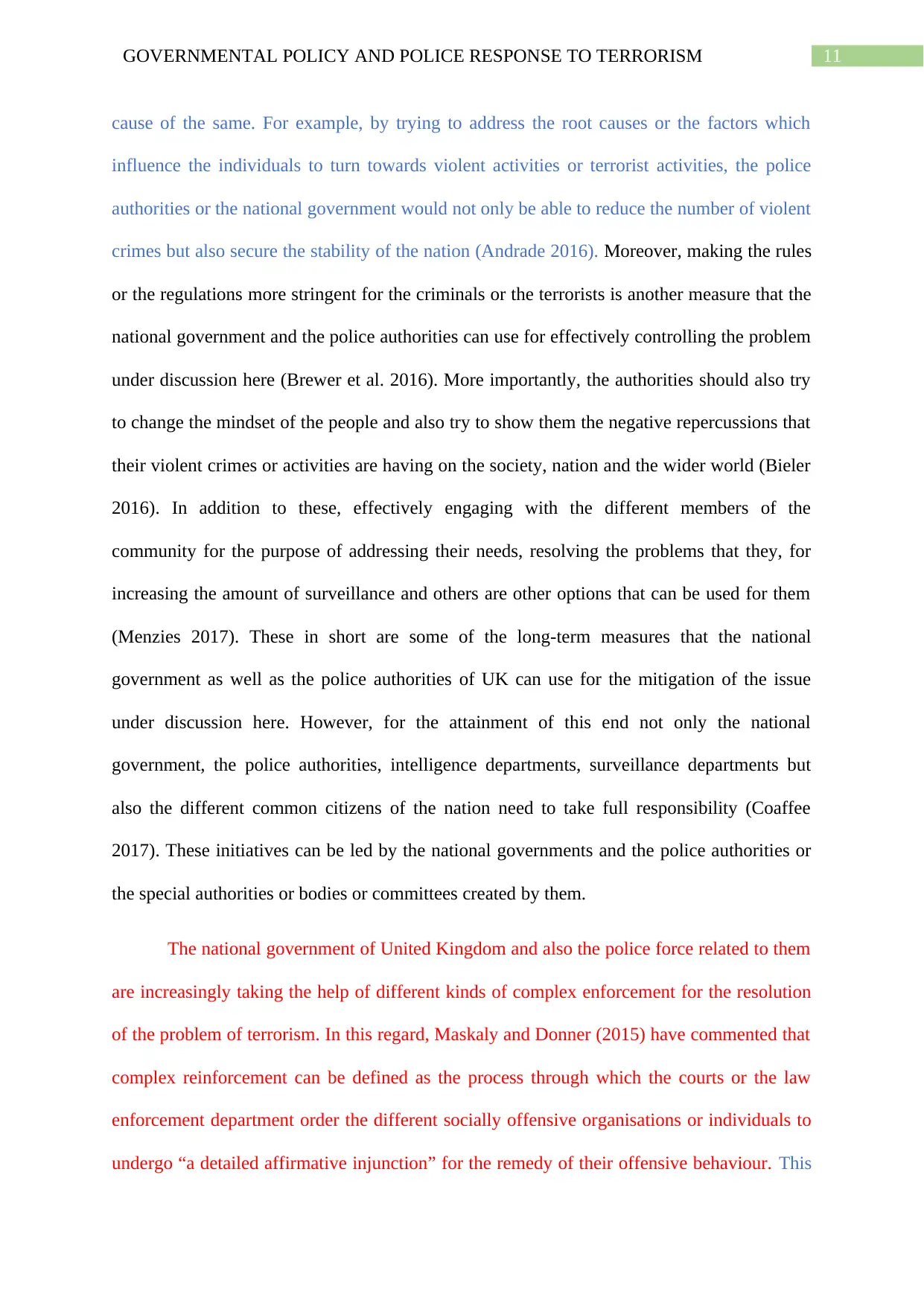
11GOVERNMENTAL POLICY AND POLICE RESPONSE TO TERRORISM
cause of the same. For example, by trying to address the root causes or the factors which
influence the individuals to turn towards violent activities or terrorist activities, the police
authorities or the national government would not only be able to reduce the number of violent
crimes but also secure the stability of the nation (Andrade 2016). Moreover, making the rules
or the regulations more stringent for the criminals or the terrorists is another measure that the
national government and the police authorities can use for effectively controlling the problem
under discussion here (Brewer et al. 2016). More importantly, the authorities should also try
to change the mindset of the people and also try to show them the negative repercussions that
their violent crimes or activities are having on the society, nation and the wider world (Bieler
2016). In addition to these, effectively engaging with the different members of the
community for the purpose of addressing their needs, resolving the problems that they, for
increasing the amount of surveillance and others are other options that can be used for them
(Menzies 2017). These in short are some of the long-term measures that the national
government as well as the police authorities of UK can use for the mitigation of the issue
under discussion here. However, for the attainment of this end not only the national
government, the police authorities, intelligence departments, surveillance departments but
also the different common citizens of the nation need to take full responsibility (Coaffee
2017). These initiatives can be led by the national governments and the police authorities or
the special authorities or bodies or committees created by them.
The national government of United Kingdom and also the police force related to them
are increasingly taking the help of different kinds of complex enforcement for the resolution
of the problem of terrorism. In this regard, Maskaly and Donner (2015) have commented that
complex reinforcement can be defined as the process through which the courts or the law
enforcement department order the different socially offensive organisations or individuals to
undergo “a detailed affirmative injunction” for the remedy of their offensive behaviour. This
cause of the same. For example, by trying to address the root causes or the factors which
influence the individuals to turn towards violent activities or terrorist activities, the police
authorities or the national government would not only be able to reduce the number of violent
crimes but also secure the stability of the nation (Andrade 2016). Moreover, making the rules
or the regulations more stringent for the criminals or the terrorists is another measure that the
national government and the police authorities can use for effectively controlling the problem
under discussion here (Brewer et al. 2016). More importantly, the authorities should also try
to change the mindset of the people and also try to show them the negative repercussions that
their violent crimes or activities are having on the society, nation and the wider world (Bieler
2016). In addition to these, effectively engaging with the different members of the
community for the purpose of addressing their needs, resolving the problems that they, for
increasing the amount of surveillance and others are other options that can be used for them
(Menzies 2017). These in short are some of the long-term measures that the national
government as well as the police authorities of UK can use for the mitigation of the issue
under discussion here. However, for the attainment of this end not only the national
government, the police authorities, intelligence departments, surveillance departments but
also the different common citizens of the nation need to take full responsibility (Coaffee
2017). These initiatives can be led by the national governments and the police authorities or
the special authorities or bodies or committees created by them.
The national government of United Kingdom and also the police force related to them
are increasingly taking the help of different kinds of complex enforcement for the resolution
of the problem of terrorism. In this regard, Maskaly and Donner (2015) have commented that
complex reinforcement can be defined as the process through which the courts or the law
enforcement department order the different socially offensive organisations or individuals to
undergo “a detailed affirmative injunction” for the remedy of their offensive behaviour. This
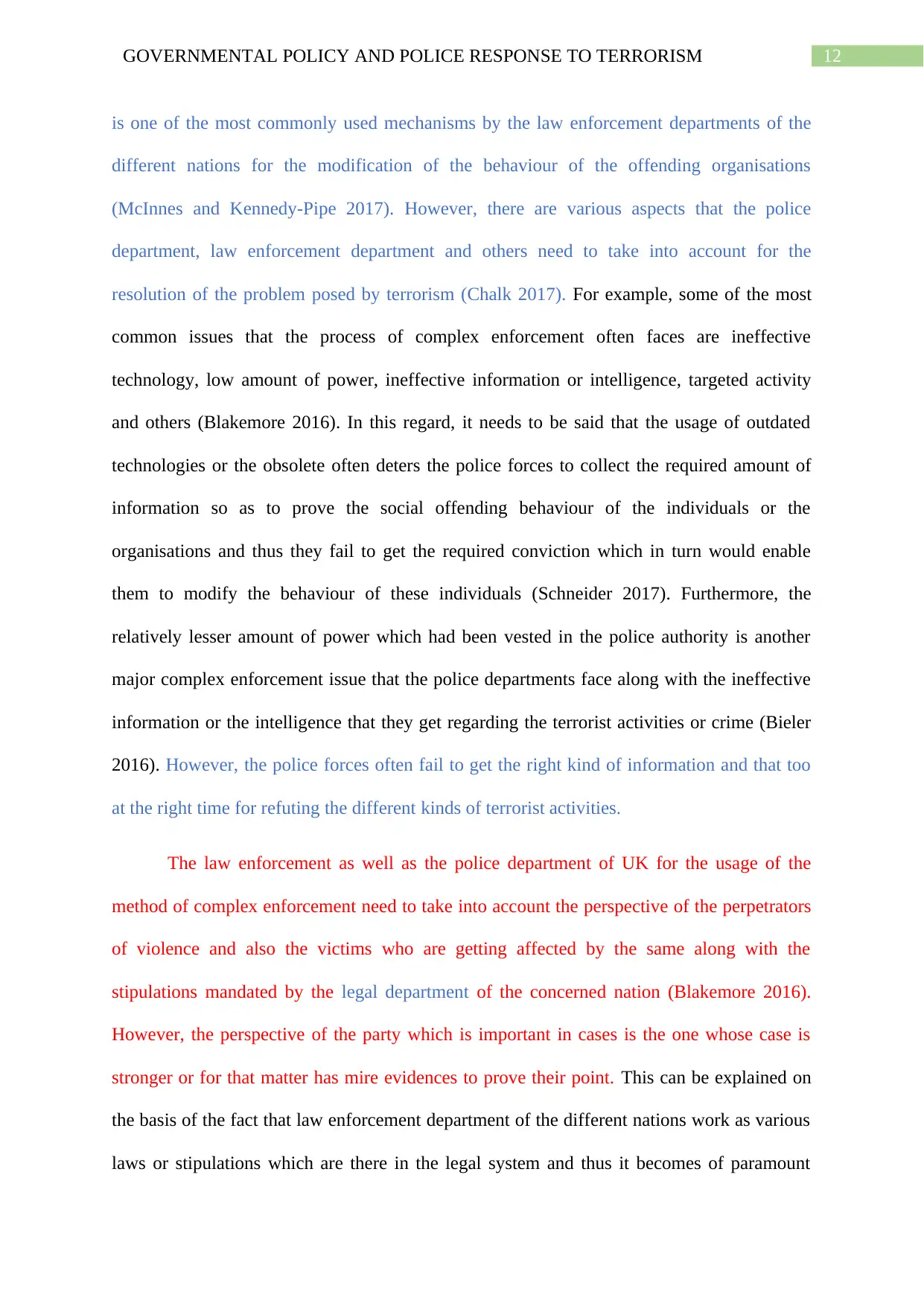
12GOVERNMENTAL POLICY AND POLICE RESPONSE TO TERRORISM
is one of the most commonly used mechanisms by the law enforcement departments of the
different nations for the modification of the behaviour of the offending organisations
(McInnes and Kennedy-Pipe 2017). However, there are various aspects that the police
department, law enforcement department and others need to take into account for the
resolution of the problem posed by terrorism (Chalk 2017). For example, some of the most
common issues that the process of complex enforcement often faces are ineffective
technology, low amount of power, ineffective information or intelligence, targeted activity
and others (Blakemore 2016). In this regard, it needs to be said that the usage of outdated
technologies or the obsolete often deters the police forces to collect the required amount of
information so as to prove the social offending behaviour of the individuals or the
organisations and thus they fail to get the required conviction which in turn would enable
them to modify the behaviour of these individuals (Schneider 2017). Furthermore, the
relatively lesser amount of power which had been vested in the police authority is another
major complex enforcement issue that the police departments face along with the ineffective
information or the intelligence that they get regarding the terrorist activities or crime (Bieler
2016). However, the police forces often fail to get the right kind of information and that too
at the right time for refuting the different kinds of terrorist activities.
The law enforcement as well as the police department of UK for the usage of the
method of complex enforcement need to take into account the perspective of the perpetrators
of violence and also the victims who are getting affected by the same along with the
stipulations mandated by the legal department of the concerned nation (Blakemore 2016).
However, the perspective of the party which is important in cases is the one whose case is
stronger or for that matter has mire evidences to prove their point. This can be explained on
the basis of the fact that law enforcement department of the different nations work as various
laws or stipulations which are there in the legal system and thus it becomes of paramount
is one of the most commonly used mechanisms by the law enforcement departments of the
different nations for the modification of the behaviour of the offending organisations
(McInnes and Kennedy-Pipe 2017). However, there are various aspects that the police
department, law enforcement department and others need to take into account for the
resolution of the problem posed by terrorism (Chalk 2017). For example, some of the most
common issues that the process of complex enforcement often faces are ineffective
technology, low amount of power, ineffective information or intelligence, targeted activity
and others (Blakemore 2016). In this regard, it needs to be said that the usage of outdated
technologies or the obsolete often deters the police forces to collect the required amount of
information so as to prove the social offending behaviour of the individuals or the
organisations and thus they fail to get the required conviction which in turn would enable
them to modify the behaviour of these individuals (Schneider 2017). Furthermore, the
relatively lesser amount of power which had been vested in the police authority is another
major complex enforcement issue that the police departments face along with the ineffective
information or the intelligence that they get regarding the terrorist activities or crime (Bieler
2016). However, the police forces often fail to get the right kind of information and that too
at the right time for refuting the different kinds of terrorist activities.
The law enforcement as well as the police department of UK for the usage of the
method of complex enforcement need to take into account the perspective of the perpetrators
of violence and also the victims who are getting affected by the same along with the
stipulations mandated by the legal department of the concerned nation (Blakemore 2016).
However, the perspective of the party which is important in cases is the one whose case is
stronger or for that matter has mire evidences to prove their point. This can be explained on
the basis of the fact that law enforcement department of the different nations work as various
laws or stipulations which are there in the legal system and thus it becomes of paramount
Paraphrase This Document
Need a fresh take? Get an instant paraphrase of this document with our AI Paraphraser
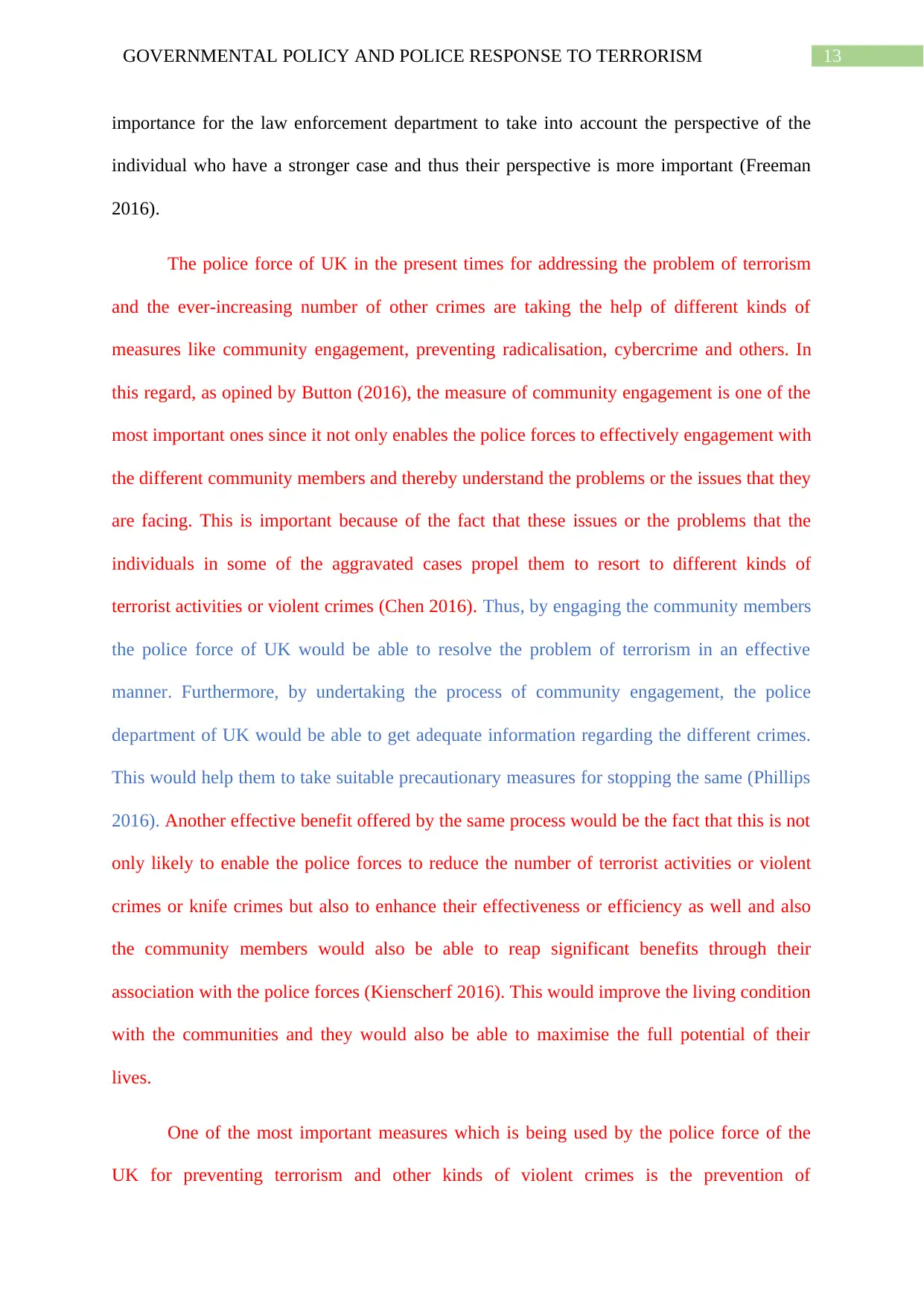
13GOVERNMENTAL POLICY AND POLICE RESPONSE TO TERRORISM
importance for the law enforcement department to take into account the perspective of the
individual who have a stronger case and thus their perspective is more important (Freeman
2016).
The police force of UK in the present times for addressing the problem of terrorism
and the ever-increasing number of other crimes are taking the help of different kinds of
measures like community engagement, preventing radicalisation, cybercrime and others. In
this regard, as opined by Button (2016), the measure of community engagement is one of the
most important ones since it not only enables the police forces to effectively engagement with
the different community members and thereby understand the problems or the issues that they
are facing. This is important because of the fact that these issues or the problems that the
individuals in some of the aggravated cases propel them to resort to different kinds of
terrorist activities or violent crimes (Chen 2016). Thus, by engaging the community members
the police force of UK would be able to resolve the problem of terrorism in an effective
manner. Furthermore, by undertaking the process of community engagement, the police
department of UK would be able to get adequate information regarding the different crimes.
This would help them to take suitable precautionary measures for stopping the same (Phillips
2016). Another effective benefit offered by the same process would be the fact that this is not
only likely to enable the police forces to reduce the number of terrorist activities or violent
crimes or knife crimes but also to enhance their effectiveness or efficiency as well and also
the community members would also be able to reap significant benefits through their
association with the police forces (Kienscherf 2016). This would improve the living condition
with the communities and they would also be able to maximise the full potential of their
lives.
One of the most important measures which is being used by the police force of the
UK for preventing terrorism and other kinds of violent crimes is the prevention of
importance for the law enforcement department to take into account the perspective of the
individual who have a stronger case and thus their perspective is more important (Freeman
2016).
The police force of UK in the present times for addressing the problem of terrorism
and the ever-increasing number of other crimes are taking the help of different kinds of
measures like community engagement, preventing radicalisation, cybercrime and others. In
this regard, as opined by Button (2016), the measure of community engagement is one of the
most important ones since it not only enables the police forces to effectively engagement with
the different community members and thereby understand the problems or the issues that they
are facing. This is important because of the fact that these issues or the problems that the
individuals in some of the aggravated cases propel them to resort to different kinds of
terrorist activities or violent crimes (Chen 2016). Thus, by engaging the community members
the police force of UK would be able to resolve the problem of terrorism in an effective
manner. Furthermore, by undertaking the process of community engagement, the police
department of UK would be able to get adequate information regarding the different crimes.
This would help them to take suitable precautionary measures for stopping the same (Phillips
2016). Another effective benefit offered by the same process would be the fact that this is not
only likely to enable the police forces to reduce the number of terrorist activities or violent
crimes or knife crimes but also to enhance their effectiveness or efficiency as well and also
the community members would also be able to reap significant benefits through their
association with the police forces (Kienscherf 2016). This would improve the living condition
with the communities and they would also be able to maximise the full potential of their
lives.
One of the most important measures which is being used by the police force of the
UK for preventing terrorism and other kinds of violent crimes is the prevention of
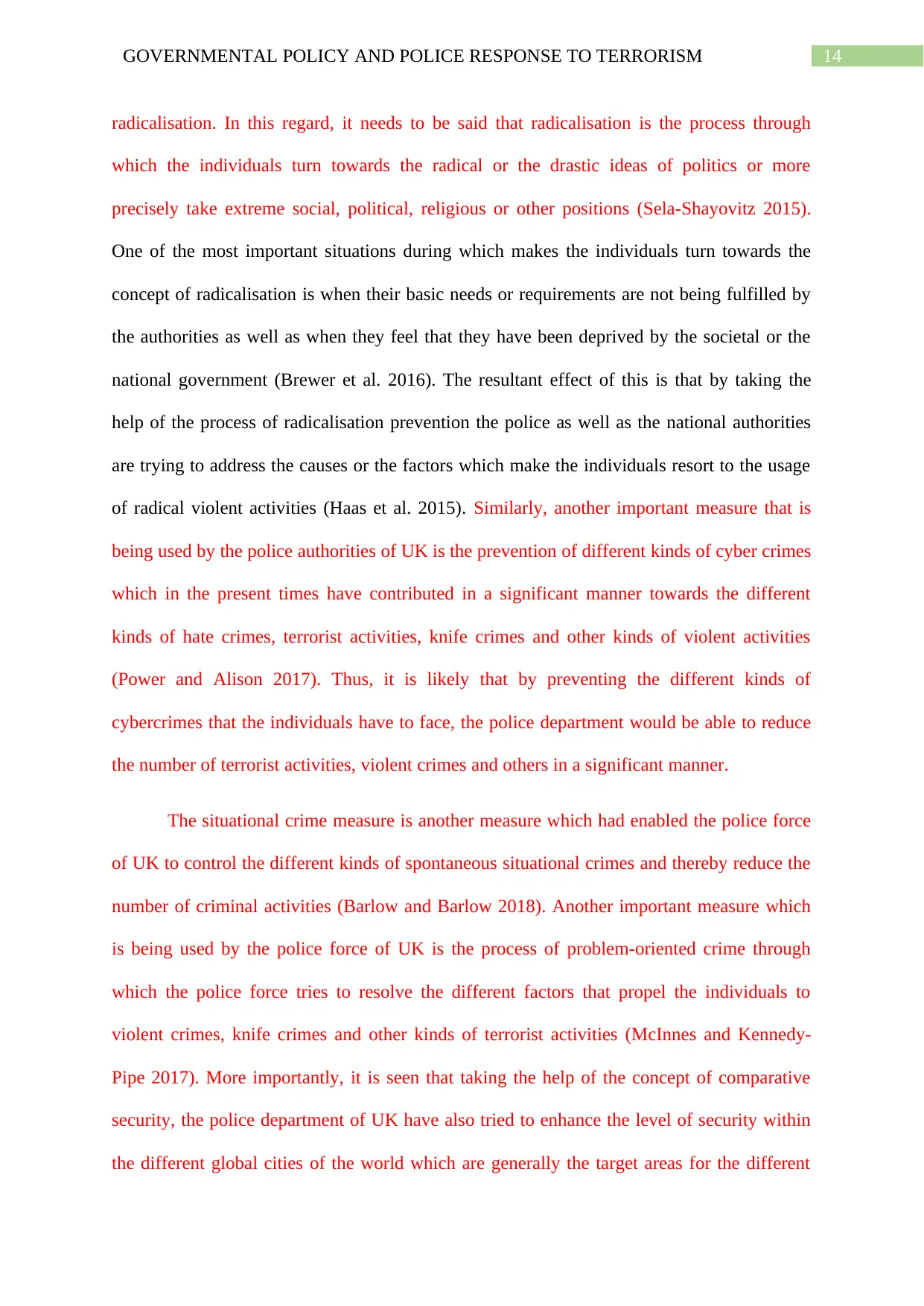
14GOVERNMENTAL POLICY AND POLICE RESPONSE TO TERRORISM
radicalisation. In this regard, it needs to be said that radicalisation is the process through
which the individuals turn towards the radical or the drastic ideas of politics or more
precisely take extreme social, political, religious or other positions (Sela-Shayovitz 2015).
One of the most important situations during which makes the individuals turn towards the
concept of radicalisation is when their basic needs or requirements are not being fulfilled by
the authorities as well as when they feel that they have been deprived by the societal or the
national government (Brewer et al. 2016). The resultant effect of this is that by taking the
help of the process of radicalisation prevention the police as well as the national authorities
are trying to address the causes or the factors which make the individuals resort to the usage
of radical violent activities (Haas et al. 2015). Similarly, another important measure that is
being used by the police authorities of UK is the prevention of different kinds of cyber crimes
which in the present times have contributed in a significant manner towards the different
kinds of hate crimes, terrorist activities, knife crimes and other kinds of violent activities
(Power and Alison 2017). Thus, it is likely that by preventing the different kinds of
cybercrimes that the individuals have to face, the police department would be able to reduce
the number of terrorist activities, violent crimes and others in a significant manner.
The situational crime measure is another measure which had enabled the police force
of UK to control the different kinds of spontaneous situational crimes and thereby reduce the
number of criminal activities (Barlow and Barlow 2018). Another important measure which
is being used by the police force of UK is the process of problem-oriented crime through
which the police force tries to resolve the different factors that propel the individuals to
violent crimes, knife crimes and other kinds of terrorist activities (McInnes and Kennedy-
Pipe 2017). More importantly, it is seen that taking the help of the concept of comparative
security, the police department of UK have also tried to enhance the level of security within
the different global cities of the world which are generally the target areas for the different
radicalisation. In this regard, it needs to be said that radicalisation is the process through
which the individuals turn towards the radical or the drastic ideas of politics or more
precisely take extreme social, political, religious or other positions (Sela-Shayovitz 2015).
One of the most important situations during which makes the individuals turn towards the
concept of radicalisation is when their basic needs or requirements are not being fulfilled by
the authorities as well as when they feel that they have been deprived by the societal or the
national government (Brewer et al. 2016). The resultant effect of this is that by taking the
help of the process of radicalisation prevention the police as well as the national authorities
are trying to address the causes or the factors which make the individuals resort to the usage
of radical violent activities (Haas et al. 2015). Similarly, another important measure that is
being used by the police authorities of UK is the prevention of different kinds of cyber crimes
which in the present times have contributed in a significant manner towards the different
kinds of hate crimes, terrorist activities, knife crimes and other kinds of violent activities
(Power and Alison 2017). Thus, it is likely that by preventing the different kinds of
cybercrimes that the individuals have to face, the police department would be able to reduce
the number of terrorist activities, violent crimes and others in a significant manner.
The situational crime measure is another measure which had enabled the police force
of UK to control the different kinds of spontaneous situational crimes and thereby reduce the
number of criminal activities (Barlow and Barlow 2018). Another important measure which
is being used by the police force of UK is the process of problem-oriented crime through
which the police force tries to resolve the different factors that propel the individuals to
violent crimes, knife crimes and other kinds of terrorist activities (McInnes and Kennedy-
Pipe 2017). More importantly, it is seen that taking the help of the concept of comparative
security, the police department of UK have also tried to enhance the level of security within
the different global cities of the world which are generally the target areas for the different
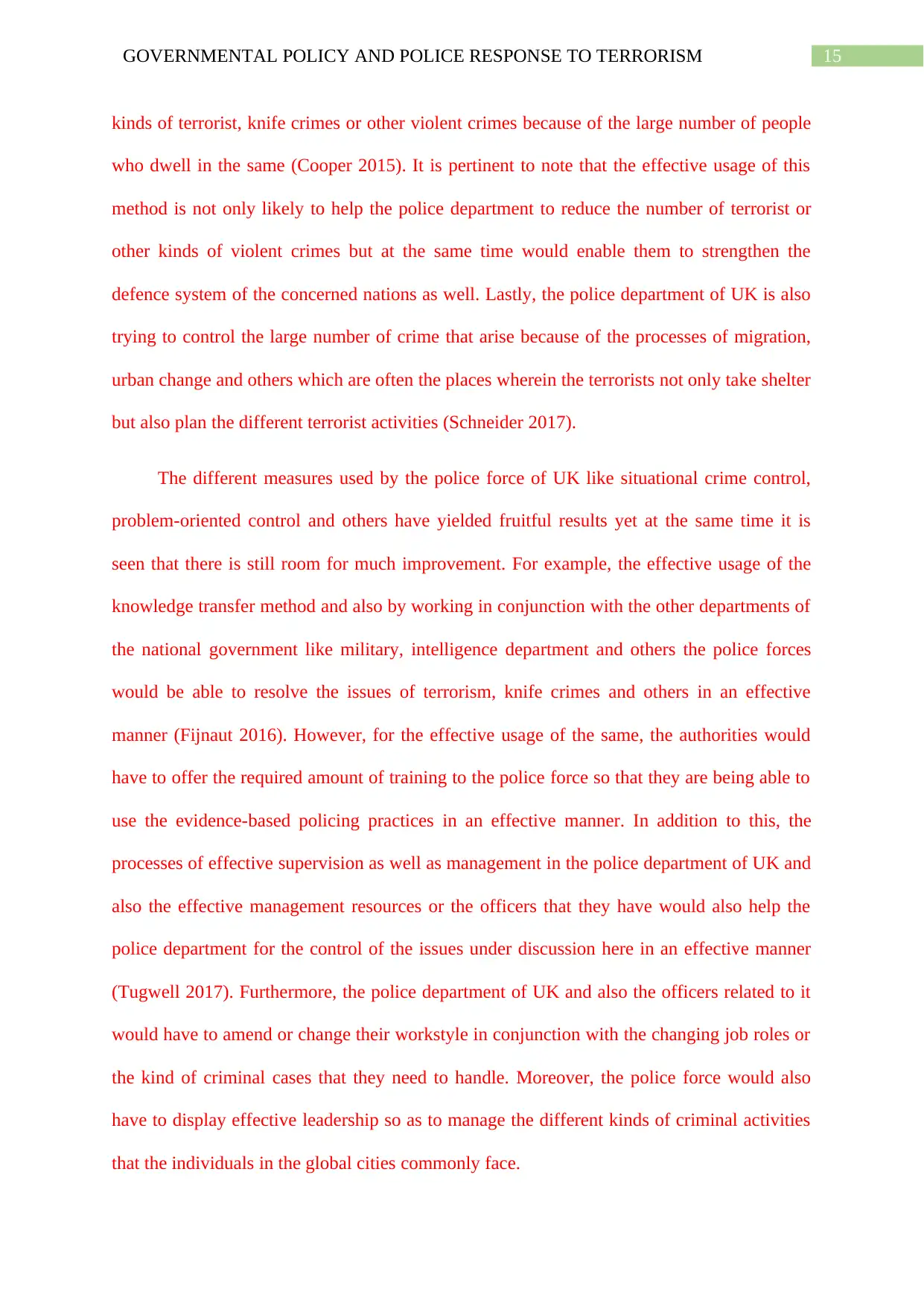
15GOVERNMENTAL POLICY AND POLICE RESPONSE TO TERRORISM
kinds of terrorist, knife crimes or other violent crimes because of the large number of people
who dwell in the same (Cooper 2015). It is pertinent to note that the effective usage of this
method is not only likely to help the police department to reduce the number of terrorist or
other kinds of violent crimes but at the same time would enable them to strengthen the
defence system of the concerned nations as well. Lastly, the police department of UK is also
trying to control the large number of crime that arise because of the processes of migration,
urban change and others which are often the places wherein the terrorists not only take shelter
but also plan the different terrorist activities (Schneider 2017).
The different measures used by the police force of UK like situational crime control,
problem-oriented control and others have yielded fruitful results yet at the same time it is
seen that there is still room for much improvement. For example, the effective usage of the
knowledge transfer method and also by working in conjunction with the other departments of
the national government like military, intelligence department and others the police forces
would be able to resolve the issues of terrorism, knife crimes and others in an effective
manner (Fijnaut 2016). However, for the effective usage of the same, the authorities would
have to offer the required amount of training to the police force so that they are being able to
use the evidence-based policing practices in an effective manner. In addition to this, the
processes of effective supervision as well as management in the police department of UK and
also the effective management resources or the officers that they have would also help the
police department for the control of the issues under discussion here in an effective manner
(Tugwell 2017). Furthermore, the police department of UK and also the officers related to it
would have to amend or change their workstyle in conjunction with the changing job roles or
the kind of criminal cases that they need to handle. Moreover, the police force would also
have to display effective leadership so as to manage the different kinds of criminal activities
that the individuals in the global cities commonly face.
kinds of terrorist, knife crimes or other violent crimes because of the large number of people
who dwell in the same (Cooper 2015). It is pertinent to note that the effective usage of this
method is not only likely to help the police department to reduce the number of terrorist or
other kinds of violent crimes but at the same time would enable them to strengthen the
defence system of the concerned nations as well. Lastly, the police department of UK is also
trying to control the large number of crime that arise because of the processes of migration,
urban change and others which are often the places wherein the terrorists not only take shelter
but also plan the different terrorist activities (Schneider 2017).
The different measures used by the police force of UK like situational crime control,
problem-oriented control and others have yielded fruitful results yet at the same time it is
seen that there is still room for much improvement. For example, the effective usage of the
knowledge transfer method and also by working in conjunction with the other departments of
the national government like military, intelligence department and others the police forces
would be able to resolve the issues of terrorism, knife crimes and others in an effective
manner (Fijnaut 2016). However, for the effective usage of the same, the authorities would
have to offer the required amount of training to the police force so that they are being able to
use the evidence-based policing practices in an effective manner. In addition to this, the
processes of effective supervision as well as management in the police department of UK and
also the effective management resources or the officers that they have would also help the
police department for the control of the issues under discussion here in an effective manner
(Tugwell 2017). Furthermore, the police department of UK and also the officers related to it
would have to amend or change their workstyle in conjunction with the changing job roles or
the kind of criminal cases that they need to handle. Moreover, the police force would also
have to display effective leadership so as to manage the different kinds of criminal activities
that the individuals in the global cities commonly face.
Secure Best Marks with AI Grader
Need help grading? Try our AI Grader for instant feedback on your assignments.
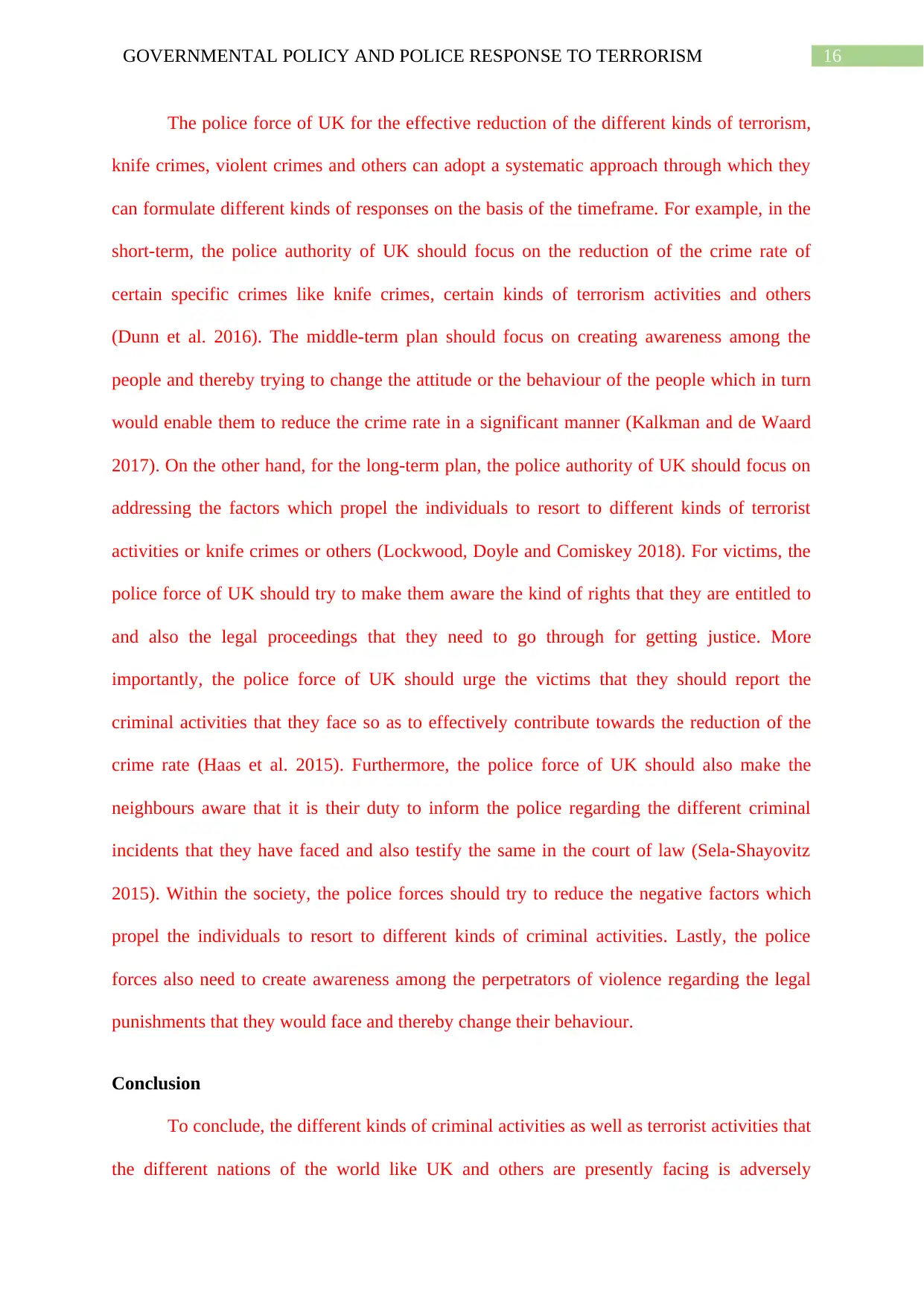
16GOVERNMENTAL POLICY AND POLICE RESPONSE TO TERRORISM
The police force of UK for the effective reduction of the different kinds of terrorism,
knife crimes, violent crimes and others can adopt a systematic approach through which they
can formulate different kinds of responses on the basis of the timeframe. For example, in the
short-term, the police authority of UK should focus on the reduction of the crime rate of
certain specific crimes like knife crimes, certain kinds of terrorism activities and others
(Dunn et al. 2016). The middle-term plan should focus on creating awareness among the
people and thereby trying to change the attitude or the behaviour of the people which in turn
would enable them to reduce the crime rate in a significant manner (Kalkman and de Waard
2017). On the other hand, for the long-term plan, the police authority of UK should focus on
addressing the factors which propel the individuals to resort to different kinds of terrorist
activities or knife crimes or others (Lockwood, Doyle and Comiskey 2018). For victims, the
police force of UK should try to make them aware the kind of rights that they are entitled to
and also the legal proceedings that they need to go through for getting justice. More
importantly, the police force of UK should urge the victims that they should report the
criminal activities that they face so as to effectively contribute towards the reduction of the
crime rate (Haas et al. 2015). Furthermore, the police force of UK should also make the
neighbours aware that it is their duty to inform the police regarding the different criminal
incidents that they have faced and also testify the same in the court of law (Sela-Shayovitz
2015). Within the society, the police forces should try to reduce the negative factors which
propel the individuals to resort to different kinds of criminal activities. Lastly, the police
forces also need to create awareness among the perpetrators of violence regarding the legal
punishments that they would face and thereby change their behaviour.
Conclusion
To conclude, the different kinds of criminal activities as well as terrorist activities that
the different nations of the world like UK and others are presently facing is adversely
The police force of UK for the effective reduction of the different kinds of terrorism,
knife crimes, violent crimes and others can adopt a systematic approach through which they
can formulate different kinds of responses on the basis of the timeframe. For example, in the
short-term, the police authority of UK should focus on the reduction of the crime rate of
certain specific crimes like knife crimes, certain kinds of terrorism activities and others
(Dunn et al. 2016). The middle-term plan should focus on creating awareness among the
people and thereby trying to change the attitude or the behaviour of the people which in turn
would enable them to reduce the crime rate in a significant manner (Kalkman and de Waard
2017). On the other hand, for the long-term plan, the police authority of UK should focus on
addressing the factors which propel the individuals to resort to different kinds of terrorist
activities or knife crimes or others (Lockwood, Doyle and Comiskey 2018). For victims, the
police force of UK should try to make them aware the kind of rights that they are entitled to
and also the legal proceedings that they need to go through for getting justice. More
importantly, the police force of UK should urge the victims that they should report the
criminal activities that they face so as to effectively contribute towards the reduction of the
crime rate (Haas et al. 2015). Furthermore, the police force of UK should also make the
neighbours aware that it is their duty to inform the police regarding the different criminal
incidents that they have faced and also testify the same in the court of law (Sela-Shayovitz
2015). Within the society, the police forces should try to reduce the negative factors which
propel the individuals to resort to different kinds of criminal activities. Lastly, the police
forces also need to create awareness among the perpetrators of violence regarding the legal
punishments that they would face and thereby change their behaviour.
Conclusion
To conclude, the different kinds of criminal activities as well as terrorist activities that
the different nations of the world like UK and others are presently facing is adversely
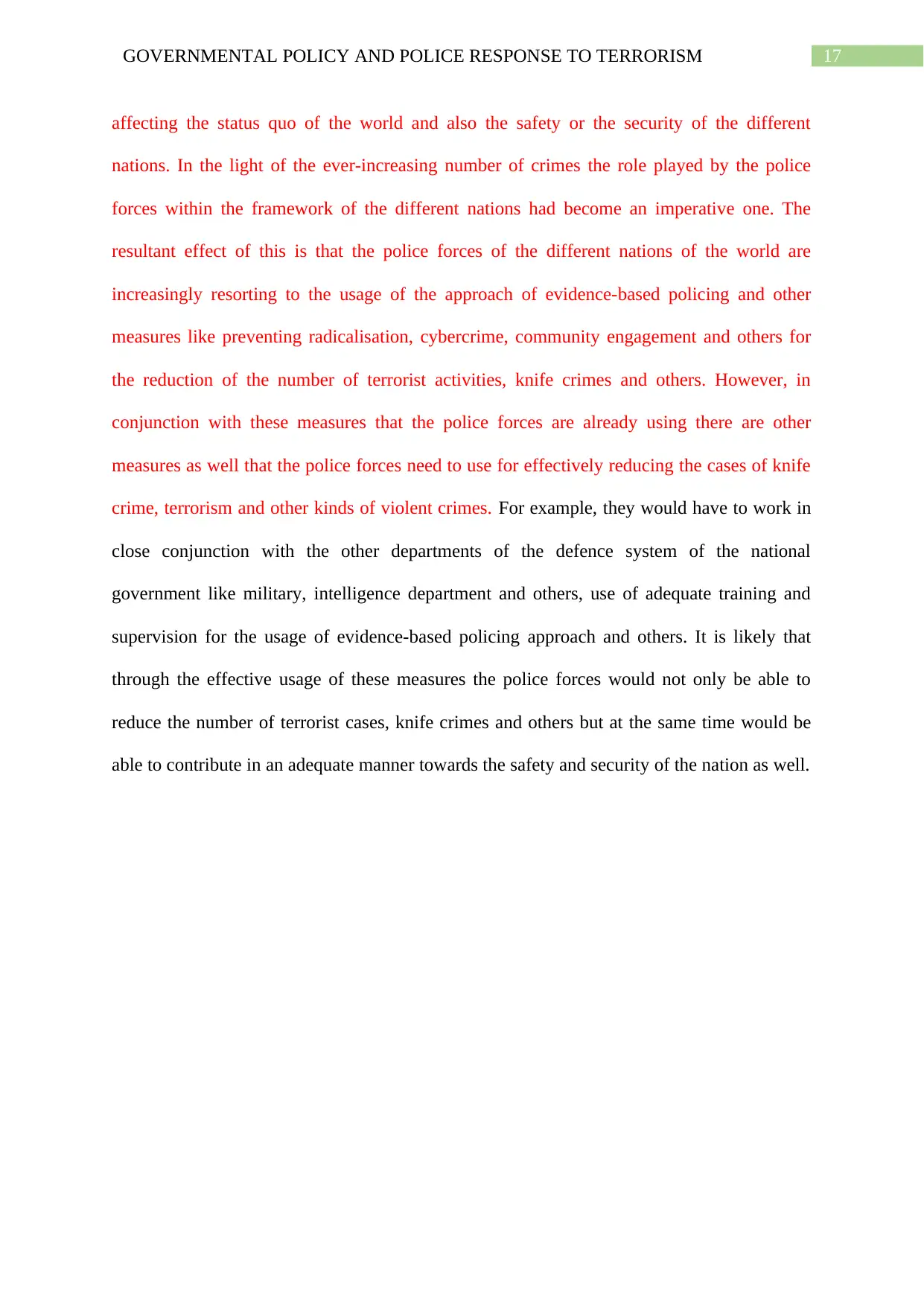
17GOVERNMENTAL POLICY AND POLICE RESPONSE TO TERRORISM
affecting the status quo of the world and also the safety or the security of the different
nations. In the light of the ever-increasing number of crimes the role played by the police
forces within the framework of the different nations had become an imperative one. The
resultant effect of this is that the police forces of the different nations of the world are
increasingly resorting to the usage of the approach of evidence-based policing and other
measures like preventing radicalisation, cybercrime, community engagement and others for
the reduction of the number of terrorist activities, knife crimes and others. However, in
conjunction with these measures that the police forces are already using there are other
measures as well that the police forces need to use for effectively reducing the cases of knife
crime, terrorism and other kinds of violent crimes. For example, they would have to work in
close conjunction with the other departments of the defence system of the national
government like military, intelligence department and others, use of adequate training and
supervision for the usage of evidence-based policing approach and others. It is likely that
through the effective usage of these measures the police forces would not only be able to
reduce the number of terrorist cases, knife crimes and others but at the same time would be
able to contribute in an adequate manner towards the safety and security of the nation as well.
affecting the status quo of the world and also the safety or the security of the different
nations. In the light of the ever-increasing number of crimes the role played by the police
forces within the framework of the different nations had become an imperative one. The
resultant effect of this is that the police forces of the different nations of the world are
increasingly resorting to the usage of the approach of evidence-based policing and other
measures like preventing radicalisation, cybercrime, community engagement and others for
the reduction of the number of terrorist activities, knife crimes and others. However, in
conjunction with these measures that the police forces are already using there are other
measures as well that the police forces need to use for effectively reducing the cases of knife
crime, terrorism and other kinds of violent crimes. For example, they would have to work in
close conjunction with the other departments of the defence system of the national
government like military, intelligence department and others, use of adequate training and
supervision for the usage of evidence-based policing approach and others. It is likely that
through the effective usage of these measures the police forces would not only be able to
reduce the number of terrorist cases, knife crimes and others but at the same time would be
able to contribute in an adequate manner towards the safety and security of the nation as well.
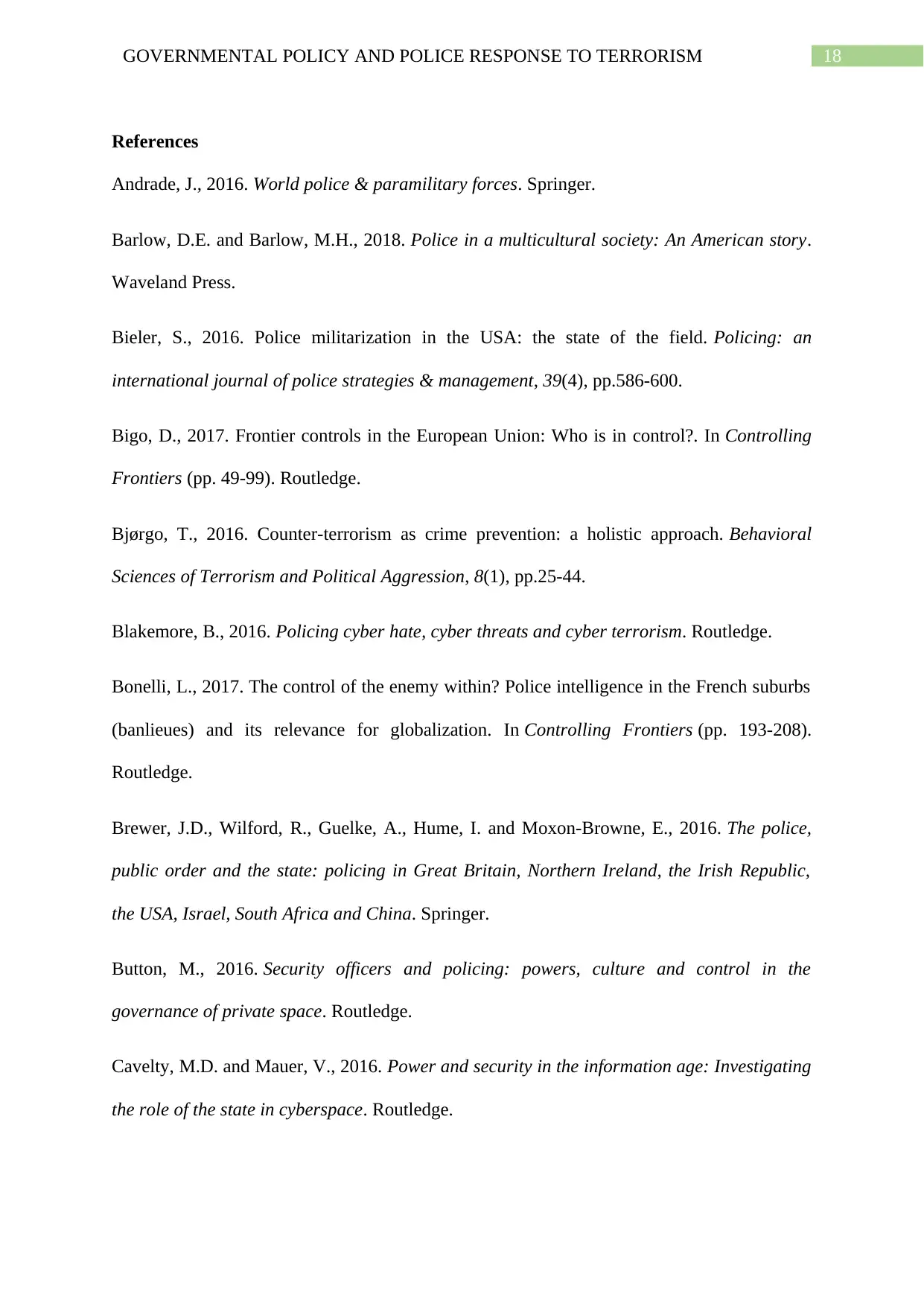
18GOVERNMENTAL POLICY AND POLICE RESPONSE TO TERRORISM
References
Andrade, J., 2016. World police & paramilitary forces. Springer.
Barlow, D.E. and Barlow, M.H., 2018. Police in a multicultural society: An American story.
Waveland Press.
Bieler, S., 2016. Police militarization in the USA: the state of the field. Policing: an
international journal of police strategies & management, 39(4), pp.586-600.
Bigo, D., 2017. Frontier controls in the European Union: Who is in control?. In Controlling
Frontiers (pp. 49-99). Routledge.
Bjørgo, T., 2016. Counter-terrorism as crime prevention: a holistic approach. Behavioral
Sciences of Terrorism and Political Aggression, 8(1), pp.25-44.
Blakemore, B., 2016. Policing cyber hate, cyber threats and cyber terrorism. Routledge.
Bonelli, L., 2017. The control of the enemy within? Police intelligence in the French suburbs
(banlieues) and its relevance for globalization. In Controlling Frontiers (pp. 193-208).
Routledge.
Brewer, J.D., Wilford, R., Guelke, A., Hume, I. and Moxon-Browne, E., 2016. The police,
public order and the state: policing in Great Britain, Northern Ireland, the Irish Republic,
the USA, Israel, South Africa and China. Springer.
Button, M., 2016. Security officers and policing: powers, culture and control in the
governance of private space. Routledge.
Cavelty, M.D. and Mauer, V., 2016. Power and security in the information age: Investigating
the role of the state in cyberspace. Routledge.
References
Andrade, J., 2016. World police & paramilitary forces. Springer.
Barlow, D.E. and Barlow, M.H., 2018. Police in a multicultural society: An American story.
Waveland Press.
Bieler, S., 2016. Police militarization in the USA: the state of the field. Policing: an
international journal of police strategies & management, 39(4), pp.586-600.
Bigo, D., 2017. Frontier controls in the European Union: Who is in control?. In Controlling
Frontiers (pp. 49-99). Routledge.
Bjørgo, T., 2016. Counter-terrorism as crime prevention: a holistic approach. Behavioral
Sciences of Terrorism and Political Aggression, 8(1), pp.25-44.
Blakemore, B., 2016. Policing cyber hate, cyber threats and cyber terrorism. Routledge.
Bonelli, L., 2017. The control of the enemy within? Police intelligence in the French suburbs
(banlieues) and its relevance for globalization. In Controlling Frontiers (pp. 193-208).
Routledge.
Brewer, J.D., Wilford, R., Guelke, A., Hume, I. and Moxon-Browne, E., 2016. The police,
public order and the state: policing in Great Britain, Northern Ireland, the Irish Republic,
the USA, Israel, South Africa and China. Springer.
Button, M., 2016. Security officers and policing: powers, culture and control in the
governance of private space. Routledge.
Cavelty, M.D. and Mauer, V., 2016. Power and security in the information age: Investigating
the role of the state in cyberspace. Routledge.
Paraphrase This Document
Need a fresh take? Get an instant paraphrase of this document with our AI Paraphraser
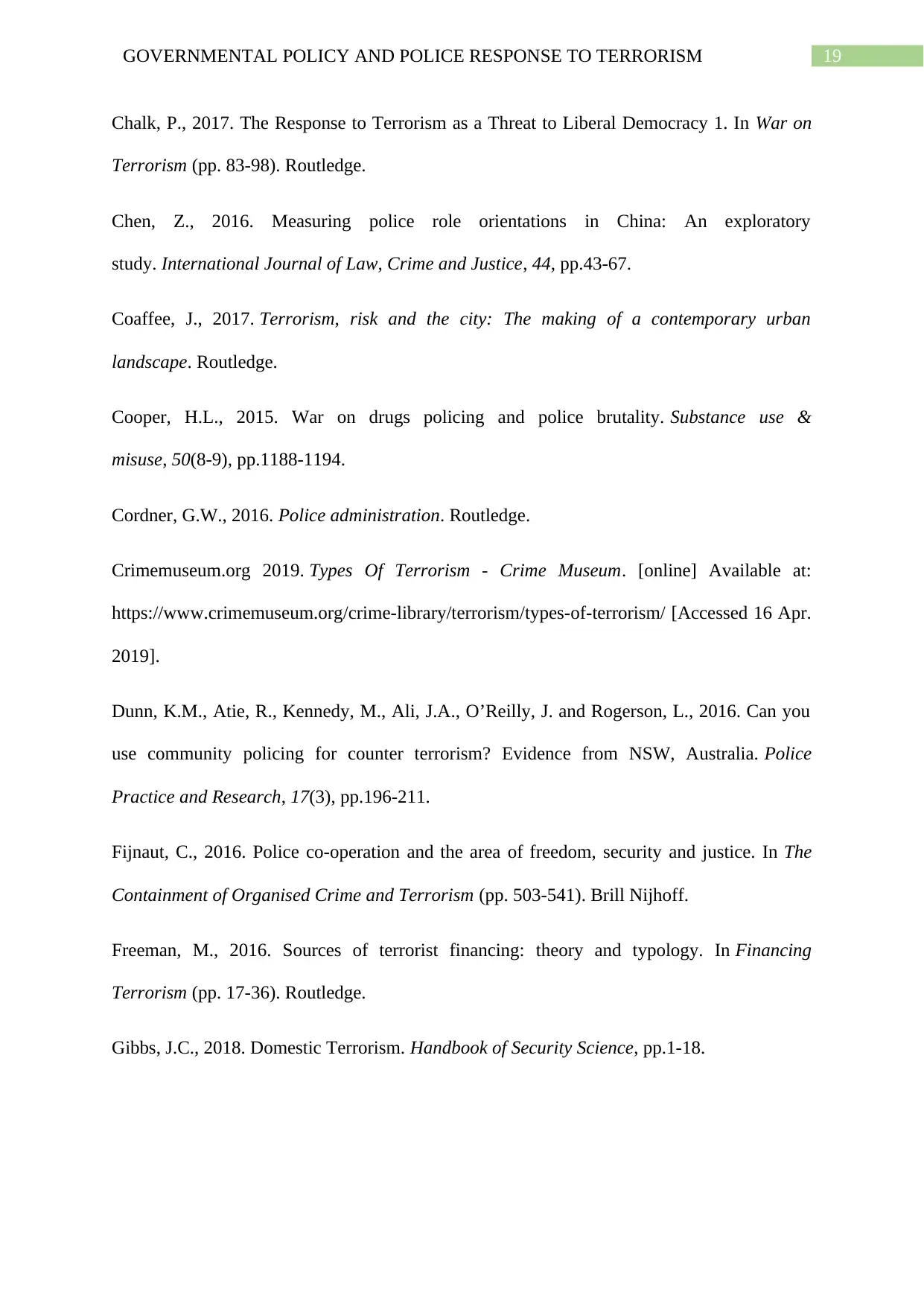
19GOVERNMENTAL POLICY AND POLICE RESPONSE TO TERRORISM
Chalk, P., 2017. The Response to Terrorism as a Threat to Liberal Democracy 1. In War on
Terrorism (pp. 83-98). Routledge.
Chen, Z., 2016. Measuring police role orientations in China: An exploratory
study. International Journal of Law, Crime and Justice, 44, pp.43-67.
Coaffee, J., 2017. Terrorism, risk and the city: The making of a contemporary urban
landscape. Routledge.
Cooper, H.L., 2015. War on drugs policing and police brutality. Substance use &
misuse, 50(8-9), pp.1188-1194.
Cordner, G.W., 2016. Police administration. Routledge.
Crimemuseum.org 2019. Types Of Terrorism - Crime Museum. [online] Available at:
https://www.crimemuseum.org/crime-library/terrorism/types-of-terrorism/ [Accessed 16 Apr.
2019].
Dunn, K.M., Atie, R., Kennedy, M., Ali, J.A., O’Reilly, J. and Rogerson, L., 2016. Can you
use community policing for counter terrorism? Evidence from NSW, Australia. Police
Practice and Research, 17(3), pp.196-211.
Fijnaut, C., 2016. Police co-operation and the area of freedom, security and justice. In The
Containment of Organised Crime and Terrorism (pp. 503-541). Brill Nijhoff.
Freeman, M., 2016. Sources of terrorist financing: theory and typology. In Financing
Terrorism (pp. 17-36). Routledge.
Gibbs, J.C., 2018. Domestic Terrorism. Handbook of Security Science, pp.1-18.
Chalk, P., 2017. The Response to Terrorism as a Threat to Liberal Democracy 1. In War on
Terrorism (pp. 83-98). Routledge.
Chen, Z., 2016. Measuring police role orientations in China: An exploratory
study. International Journal of Law, Crime and Justice, 44, pp.43-67.
Coaffee, J., 2017. Terrorism, risk and the city: The making of a contemporary urban
landscape. Routledge.
Cooper, H.L., 2015. War on drugs policing and police brutality. Substance use &
misuse, 50(8-9), pp.1188-1194.
Cordner, G.W., 2016. Police administration. Routledge.
Crimemuseum.org 2019. Types Of Terrorism - Crime Museum. [online] Available at:
https://www.crimemuseum.org/crime-library/terrorism/types-of-terrorism/ [Accessed 16 Apr.
2019].
Dunn, K.M., Atie, R., Kennedy, M., Ali, J.A., O’Reilly, J. and Rogerson, L., 2016. Can you
use community policing for counter terrorism? Evidence from NSW, Australia. Police
Practice and Research, 17(3), pp.196-211.
Fijnaut, C., 2016. Police co-operation and the area of freedom, security and justice. In The
Containment of Organised Crime and Terrorism (pp. 503-541). Brill Nijhoff.
Freeman, M., 2016. Sources of terrorist financing: theory and typology. In Financing
Terrorism (pp. 17-36). Routledge.
Gibbs, J.C., 2018. Domestic Terrorism. Handbook of Security Science, pp.1-18.
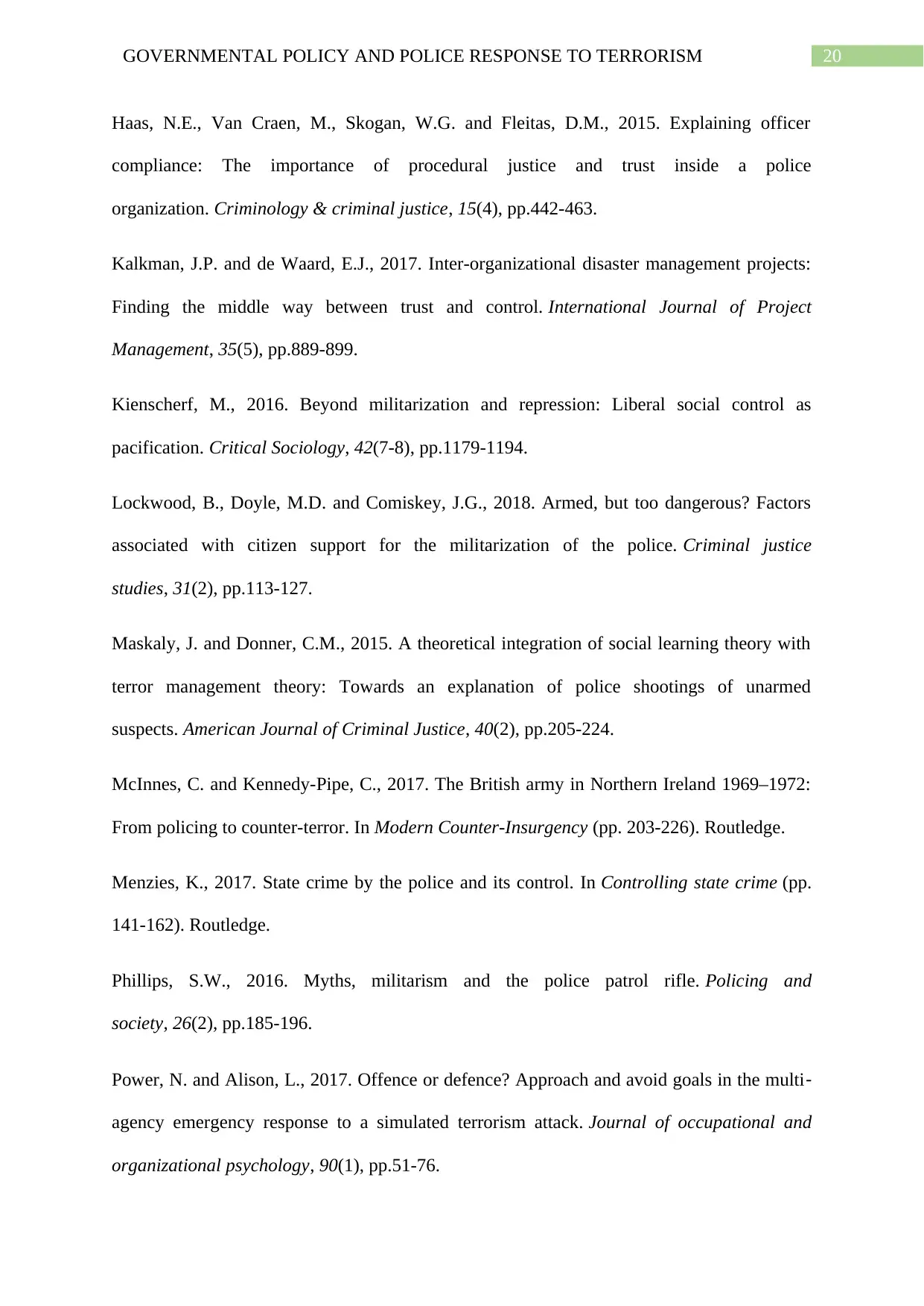
20GOVERNMENTAL POLICY AND POLICE RESPONSE TO TERRORISM
Haas, N.E., Van Craen, M., Skogan, W.G. and Fleitas, D.M., 2015. Explaining officer
compliance: The importance of procedural justice and trust inside a police
organization. Criminology & criminal justice, 15(4), pp.442-463.
Kalkman, J.P. and de Waard, E.J., 2017. Inter-organizational disaster management projects:
Finding the middle way between trust and control. International Journal of Project
Management, 35(5), pp.889-899.
Kienscherf, M., 2016. Beyond militarization and repression: Liberal social control as
pacification. Critical Sociology, 42(7-8), pp.1179-1194.
Lockwood, B., Doyle, M.D. and Comiskey, J.G., 2018. Armed, but too dangerous? Factors
associated with citizen support for the militarization of the police. Criminal justice
studies, 31(2), pp.113-127.
Maskaly, J. and Donner, C.M., 2015. A theoretical integration of social learning theory with
terror management theory: Towards an explanation of police shootings of unarmed
suspects. American Journal of Criminal Justice, 40(2), pp.205-224.
McInnes, C. and Kennedy-Pipe, C., 2017. The British army in Northern Ireland 1969–1972:
From policing to counter-terror. In Modern Counter-Insurgency (pp. 203-226). Routledge.
Menzies, K., 2017. State crime by the police and its control. In Controlling state crime (pp.
141-162). Routledge.
Phillips, S.W., 2016. Myths, militarism and the police patrol rifle. Policing and
society, 26(2), pp.185-196.
Power, N. and Alison, L., 2017. Offence or defence? Approach and avoid goals in the multi‐
agency emergency response to a simulated terrorism attack. Journal of occupational and
organizational psychology, 90(1), pp.51-76.
Haas, N.E., Van Craen, M., Skogan, W.G. and Fleitas, D.M., 2015. Explaining officer
compliance: The importance of procedural justice and trust inside a police
organization. Criminology & criminal justice, 15(4), pp.442-463.
Kalkman, J.P. and de Waard, E.J., 2017. Inter-organizational disaster management projects:
Finding the middle way between trust and control. International Journal of Project
Management, 35(5), pp.889-899.
Kienscherf, M., 2016. Beyond militarization and repression: Liberal social control as
pacification. Critical Sociology, 42(7-8), pp.1179-1194.
Lockwood, B., Doyle, M.D. and Comiskey, J.G., 2018. Armed, but too dangerous? Factors
associated with citizen support for the militarization of the police. Criminal justice
studies, 31(2), pp.113-127.
Maskaly, J. and Donner, C.M., 2015. A theoretical integration of social learning theory with
terror management theory: Towards an explanation of police shootings of unarmed
suspects. American Journal of Criminal Justice, 40(2), pp.205-224.
McInnes, C. and Kennedy-Pipe, C., 2017. The British army in Northern Ireland 1969–1972:
From policing to counter-terror. In Modern Counter-Insurgency (pp. 203-226). Routledge.
Menzies, K., 2017. State crime by the police and its control. In Controlling state crime (pp.
141-162). Routledge.
Phillips, S.W., 2016. Myths, militarism and the police patrol rifle. Policing and
society, 26(2), pp.185-196.
Power, N. and Alison, L., 2017. Offence or defence? Approach and avoid goals in the multi‐
agency emergency response to a simulated terrorism attack. Journal of occupational and
organizational psychology, 90(1), pp.51-76.
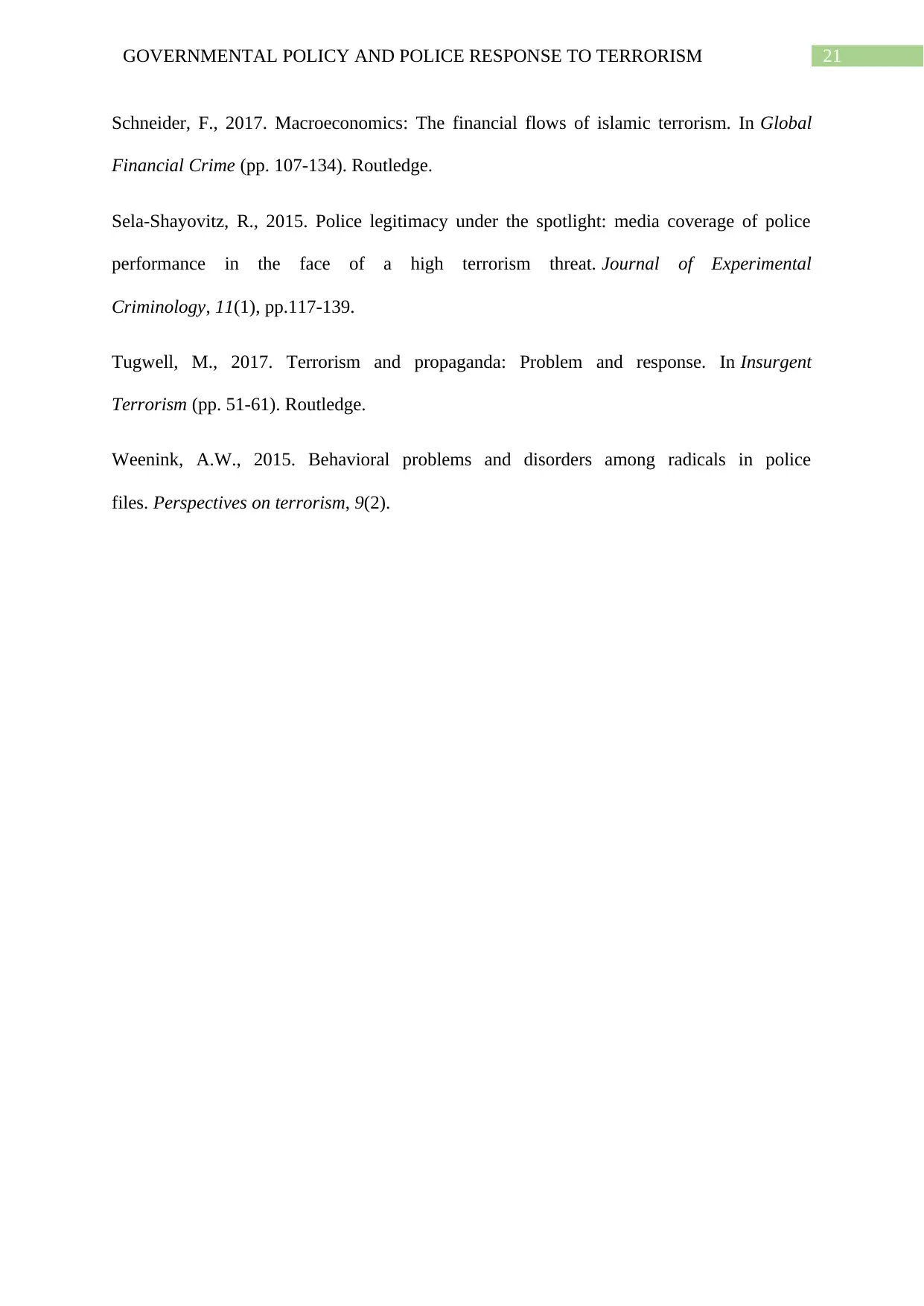
21GOVERNMENTAL POLICY AND POLICE RESPONSE TO TERRORISM
Schneider, F., 2017. Macroeconomics: The financial flows of islamic terrorism. In Global
Financial Crime (pp. 107-134). Routledge.
Sela-Shayovitz, R., 2015. Police legitimacy under the spotlight: media coverage of police
performance in the face of a high terrorism threat. Journal of Experimental
Criminology, 11(1), pp.117-139.
Tugwell, M., 2017. Terrorism and propaganda: Problem and response. In Insurgent
Terrorism (pp. 51-61). Routledge.
Weenink, A.W., 2015. Behavioral problems and disorders among radicals in police
files. Perspectives on terrorism, 9(2).
Schneider, F., 2017. Macroeconomics: The financial flows of islamic terrorism. In Global
Financial Crime (pp. 107-134). Routledge.
Sela-Shayovitz, R., 2015. Police legitimacy under the spotlight: media coverage of police
performance in the face of a high terrorism threat. Journal of Experimental
Criminology, 11(1), pp.117-139.
Tugwell, M., 2017. Terrorism and propaganda: Problem and response. In Insurgent
Terrorism (pp. 51-61). Routledge.
Weenink, A.W., 2015. Behavioral problems and disorders among radicals in police
files. Perspectives on terrorism, 9(2).
1 out of 22
Your All-in-One AI-Powered Toolkit for Academic Success.
+13062052269
info@desklib.com
Available 24*7 on WhatsApp / Email
![[object Object]](/_next/static/media/star-bottom.7253800d.svg)
Unlock your academic potential
© 2024 | Zucol Services PVT LTD | All rights reserved.

